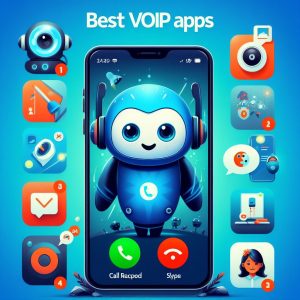Introduction
Voice over Internet Protocol (VoIP) phone services have become an essential part of both personal and business communication. VoIP allows users to make phone calls over the internet rather than traditional phone lines. This brings many advantages, such as lower costs, more features, and greater flexibility. For those looking to benefit from VoIP without spending money on a paid service, free VoIP providers offer a great alternative.
Free VoIP services provide users with free phone numbers and unlimited calling and texting to other users on the same service. While they do have some limitations compared to paid options, free services enable basic communication without any monthly fees. As VoIP phone technology continues advancing, free services are becoming surprisingly robust.
When considering a switch to free VoIP services, there are several key factors to weigh regarding calling capabilities, phone number options, ease of use, reliability, and customer support. The best free services offer a balance across these areas to deliver a quality experience. Read on for an in-depth look at the top free VoIP providers and how to choose the right one for your needs.
Factors to Consider When Choosing a Free VoIP Phone Service
Unlimited calls and texts
One of the main draws of free VoIP services is unlimited calling and texting without incurring any charges. Most services allow for unlimited talk and text between users on the same platform. Some also provide unlimited calling and texting to mobile phones and landlines in certain countries.
When evaluating options, look for details on which types of calls are unlimited to ensure the service will meet your communication needs. Some services cap monthly usage while others have restrictions on call duration or frequency. Understanding any limitations is key to finding the right free VoIP provider.
Phone numbers
Most free VoIP services provide users with a free phone number to enable calling and texting. In some cases, you can select your phone number based on available area codes. Other providers automatically assign numbers.
Consider whether you need a phone number with a specific area code based on your location. Some services offer number porting if you want to transfer an existing number. Assess each provider’s offerings to ensure you can get the phone number options you require.
Ease of use
Free VoIP phone services typically require downloading an app on your desktop, laptop, smartphone or tablet to start making calls. The interface and call/texting capabilities can vary greatly between providers. Evaluate how easy each service is to set up and use for your needs.
Some services integrate directly with your device’s native calling and texting apps for smoother operation. Others rely solely on their own apps. If you want an extremely simple and straightforward free VoIP option, assess the user-friendliness of the top choices.
Reliability
When relying on free VoIP services for personal or business communication, reliability is clearly essential. Issues like dropped calls, choppy audio, or losing connectivity mid-call can quickly become unacceptable.
Research the reputation of leading free VoIP providers in terms of call quality and network uptime/reliability. Check for user reviews and complaints regarding reliability issues as well. Prioritize stability and quality over features when evaluating options if dependability is your top concern.
Customer support
Even free services should have solid customer support in case any problems arise with your account, connectivity, calling capabilities or more. Check what support options are available for free users, whether it be live chat, phone, email, online knowledge bases or user forums.
Give preference to those that provide multiple reliable support channels for a better overall user experience. Without quality assistance available, resolving inevitable service issues can prove challenging with free VoIP providers.

Top Free VoIP Phone Services for 2024
TextNow: Best Overall
TextNow stands above the competition as the best overall free VoIP phone service. With over 25 million users globally, TextNow enables free unlimited calls and texts over WiFi or your phone’s data connection. It comes packed with features meeting even demanding business and personal calling needs.
Pros
- Truly unlimited calling/texting between TextNow users
- Call and text actual cell phones and landlines (restrictions apply)
- Assign your area code of choice for new number
- Keep your existing number (full support for number porting)
- Excellent reliability and call quality
- Easy account setup and management
- Capable of supporting business communication needs
- User-friendly mobile and desktop apps
- Calling and texting works over both WiFi and cellular data
- No limits on call duration like some rivals
Cons
- Calling phones outside the TextNow network deducts from monthly allotment
- Need to create an account to get started
- Some ads present within smartphone app
Features
Key features that make TextNow stand out include:
- Get a free phone number with your choice of area code
- Unlimited calling and texting between TextNow users
- Unlimited texts to any US/Canada number
- 200 monthly minutes for calls to US/Canada landlines and mobile phones
- Voicemail support and call forwarding/waiting options
- Conference calling with up to 5 participants
- Caller ID to easily manage incoming calls
- Directory access to easily look up businesses
- Team messaging and account management functions
- Mobile and desktop apps for iOS, Android, Windows, Mac
With its unbeatable combination of free unlimited usage between TextNow members and generous standards calls/texts allotments each month, TextNow is the free VoIP provider that ticks all the boxes.
Other Notable Free VoIP Phone Services
Beyond TextNow, there are a handful of other quality free VoIP services that may suit some users’ needs better. Here’s an overview of key alternatives:
Google Voice
Google Voice is a widely-used VoIP service from the technology giant. Its biggest drawback compared to TextNow is no free unlimited calling, but it does offer the following:
Pros
- Deep integration with Google services like Gmail
- Keep your existing number or get new number
- Low per-minute calling rates to US and Canada
- Call forwarding and voicemail transcription
- Spam call filtering and blocking
Cons
- No unlimited free calling options
- Limit of max 1500 minutes of calls per month
- Primarily designed just for calling rather than texting
Features
Some of the top features with Google Voice include:
- Make affordable phone calls via Google Voice app or directly in Gmail
- Get a free phone number with your choice of area code
- Transcribe voicemails and read them in your Gmail inbox
- Customize greetings and set up call forwarding to any phone number
- Block unwanted calls and filter out suspected spam
- Review call and voicemail history to stay organized
- Works on iOS, Android, computers through Chrome browser
Google Voice appeals most to users deeply ingrained in Google’s ecosystem. But its lack of free unlimited calling hinders it in comparison to TextNow overall.
Fongo
Fongo is another very popular free VoIP solution in Canada. It stands out through generous monthly minute allotments and a bevy of features.
Pros
- 600 monthly minutes for calls to Canadian/US numbers
- Unlimited Canadian texts each month
- Top-notch call quality and reliability
- Number porting and number selection abilities
- Generous array of features like voicemail, call display and call forwarding
Cons
- Lacks truly unlimited free calling of TextNow
- Primarily focused on Canadian consumer market
- Requires a bit more setup than other rivals
Features
Fongo comes well-equipped with functionality like:
- Get your own Canadian number or bring your current one
- Make affordable calls to landlines and mobile phones
- Unlimited nationwide Canadian texting
- Voicemail support with transcription available
- 3-way calling to easily connect multiple callers
- Call Display and Reminder Call features
- Call Forwarding configuration options
- Mobile and desktop apps offered
Fongo hits many ticks for a free VoIP service. But TextNow still surpasses it through more inclusive unlimited calling and texting as well as broader device platform support.

How to Use VoIP for Free
If you pick TextNow or another quality free VoIP provider, getting started using the service is quick and simple:
Download and install the chosen software
Each service has mobile apps for both iOS and Android phones/tablets along with desktop apps for Windows and Mac. Download the app for your device(s) directly from the provider or respective app store. The installation process only takes a couple minutes.
Set up your phone number
When first launching the app, you’ll be prompted to configure your account and phone number. Select your area code of choice (if applicable) and specify if you want to port your existing number. Follow any additional prompts to finish setting up your account credentials and payment details (even though it’s a free service).
Start making calls and sending texts
Once your account is setup, simply grant any permissions the app requires like accessing your microphone, contacts list, phone and more. You can immediately start placing calls and sending SMS texts to other users on the platform completely free. Enjoy unlimited communication!
Be sure to check your monthly allotment of minutes and texts to non-users on the service. This allotment varies by provider but enables affordable outside calling and texting in addition to internal unlimited usage. Monitor your usage to avoid any overage charges at the end of the month.
Limitations of Free VoIP Phone Services
While free VoIP providers grant users plenty of calling, texting and essential features, there are some limitations to note with these services compared to paid solutions:
Limited features for business users
Most free VoIP options cater primarily to personal users. As such, common business-centric capabilities like call routing, shared phone numbers, multiple user accounts and more aren’t supported. These services can accommodate basic sole proprietor business needs. But growing teams and companies require more advanced functionality.
Calling limitations
Unlimited calling and texts usually only apply when contacting other users on the same free VoIP network. Outside calls to other numbers often have restrictions like allotments per month, maximum duration per call and prohibitions on certain call types like emergency calls. Know precisely what types of calls are covered to avoid surprising charges.
Only allowing incoming calls
Some free VoIP mobile apps don’t permit users to place outgoing calls from their smartphone. The service only works for receiving calls on the device’s native phone app. Limitations like this can frustrate users wanting to fully utilize a free service from their mobile device.
Restrictions on the number of calls per month
While internal calls are typically unlimited, outside calls and texts usually have hard limits ranging from a few hundred to a few thousand minutes monthly. Going over this allotment often incurs per-minute charges defeating the purpose of an otherwise “free” service. Pay close attention to external usage allowances.
VoIP Advantages and Disadvantages
Beyond the context of free services, VoIP technology as a whole for phone calling has some inherent pluses and minuses to factor in:
Advantages of VoIP phone systems
Cost savings
VoIP can significantly reduce monthly phone bills compared to conventional calling plans. Between no expensive hardware purchases and cheaper overall calling rates, businesses have slashed 50% or more off expenses. Personal users also spend much less each month relying on VoIP services.
Flexibility
You aren’t limited only using a desk phone with VoIP systems. Through software apps, users can place and receive calls on smartphones, tablets, laptops, desktops and more regardless of location. Better mobility and connectivity options cater to remote teams and traveling professionals.
Scalability
Cloud-based VoIP platforms make scaling up calling capacity quick and simple without huge hardware investments. Companies can get additional phone lines for new hires, enable features like auto-attendants and fund other expansions through intuitive online dashboards rather than costly service visits.
Disadvantages of VoIP phone systems
Reliability
While VoIP call quality has improved significantly, reliability depends heavily on your internet connection bandwidth and strength. Choppy calls or loss of service from power outages remain more common than traditional plain old telephone service (POTS).
Security concerns
With calls transmitted as data, adequate cybersecurity protections are essential to prevent eavesdropping or unauthorized access. Encryption and other precautions add layers of complexity absent from conventional phone services. Outages due to distributed denial-of-service (DDoS) attacks also prove more disruptive with VoIP providers.
Quality of service
Some loss in call quality remains expected with VoIP compared to legacy phone networks. Features like noise suppression and lag buffers ease this gap. But sound artifacts and delays persist, especially when bandwidth becomes constrained during high-traffic periods.
Carefully weigh the pros and cons of VoIP itself depending on your use case and sensitivity to the above disadvantages. When implemented properly, most organizations and individuals ultimately benefit greatly from transitioning to more modern voice calling architectures.

Conclusion
Free VoIP phone services make staying connected with family, friends and business contacts a breeze without monthly costs. Leading options like TextNow offer free unlimited calling and texting in an easy-to-use app with impressive overall quality and reliability.
While weighing choices, prioritize core factors like generous usage allotments, number portability, call clarity and platform support across your devices. Determine any needs for business functionality if required as well. Free VoIP limitations exist mainly for external usage and certain business-centric capabilities. But top providers deliver a very solid free alternative to paid solutions.
Transitioning fully to free VoIP calling does require a bit of adjustment from legacy phone services. But with proper expectations set on restrictions to complement the many benefits, users find these free platforms more than capable of meeting their essential communication needs.
Introduction
Voice over Internet Protocol (VoIP) refers to making and receiving phone calls over the internet, rather than traditional analog telephone lines. VoIP apps allow users to access these internet-based phone services from their smartphones, tablets, or computers. As high-speed internet and mobile data continue growing globally, VoIP apps are becoming indispensable both personally and for business communication.
With so many options now available, selecting the best performing VoIP app tailored to your specific needs and use case proves essential. This comprehensive guide outlines the leading app contenders based on critical evaluation criteria, capabilities, use case alignments, and customer reputation.
What are VoIP Apps?
VoIP apps represent software applications enabling users to make and receive voice calls over broadband internet connections instead of traditional phone lines using analog signals. They convert phone conversations into data packets able to transmit efficiently over the internet and other IP data networks.
Definition of VoIP Apps
VoIP apps allow connecting phone calls via wifi or mobile data services rather than conventional phone lines or even cellular voice minutes. They encode analog voice signals into digital packets for sending over the internet to other VoIP users or bridges interfacing traditional PSTN phone lines around the world.
Smart VoIP apps also extend powerful telephony features like auto-attendants, voicemail, conferencing and call forwarding analogous to sophisticated PBX phone systems but accessible from smartphones, browsers or desktop clients. Integrated texting and video chat also feature prominently across leading options.
How VoIP Apps Differ from Traditional Telephony
Unlike legacy landline or mobile calls running purely over switched circuit voice networks built exclusively for real-time phone services, VoIP leverages multipurpose internet pipelines optimized for all web data. This allows for richer call handling apps, affordability and mobility exceedingly impractical implementing through traditional telecom carriers.
VoIP bypasses distance-based pricing regimes imposed by incumbents. Enhanced functionality like transcribed voicemail, unlimited texting and conference calls would prove enormously expensive furnished by conventional providers.
Additional Features VoIP Apps Offer
Beyond basic voice calling substitution matching analog phones, VoIP apps unlock a wealth of tools:
- Video Conferencing with Screen Sharing
- Instant Messaging / SMS Text Capacity
- Visual Voicemail and Transcription
- Call Analytics Dashboards
- Integrated Contact Center Options
- Salesforce, Zendesk and Other CRM Embedding
- Custom Application Integration Extensibility
These features seamlessly converge multiple communication channels into unified experiences accessible reliably from smartphones anywhere rather than specialized equipment fixed to offices.

Benefits of VoIP for Business Communication
Migrating business communications like calling and meetings onto cloud-hosted VoIP and conferencing solutions powered by intuitive smartphone apps unlocks major feature enhancements alongside cost reductions.
Cost-Effectiveness and Flexibility
VoIP solutions replace expensive conventional phone bills with simple scalable per user monthly subscriptions pooling minutes and functionalities allowing businesses to precisely scale capabilities according to real needs and ROI.
By utilizing the same internet connectivity for both data applications and voice, dedicated legacy phone expenditures get eliminated while gains in staff productivity and customer service follow.
Features Enhancing Collaboration and Efficiency
VoIP app capabilities like video meetings with document co-editing, mass texting, call queue prioritization, auto-attendants and CRM screenpops heighten internal collaboration, sales productivity and external support resolutions.
Structured directories, customizable IVRs, group messaging threads and presence indicators keep distributed staff, vendors and customers looped in and accessible through correct channels maintaining responsiveness.
Positive feedback loops like immediate post-call surveys and selective call monitoring help managers continuously improve efforts. Integrated business analytics with custom reporting track KPIs like handling durations, queue abandon percentages and optimal contact times guiding strategic optimizations.
Security and Privacy
With voice calls and sensitive internal communications transmitted over the public internet, evaluating VoIP app security provisions proves critical to ensure private conversations remain protected from interceptions or unauthorized monitoring.
VoIP apps should utilize end-to-end encryption, secure access portals and multi-factor authentication to protect accounts from intrusions. Frequent independent security audits establish ongoing due diligence monitoring threats and prompt patching of any system or infrastructure vulnerabilities identified before potential exploitation.
Data center physical access controls, hardware tampering safeguards, network traffic protections and regular 3rd party penetration testing also help certify structural protections insulating app-based communications from unlawful capture or surveillance.
Carefully review each provider’s specific security technical white papers and compliance assurances before committing business communications to a VoIP platform. Seek established brands with reputations prioritizing continuously evolving security to match fast-changing cyber threat landscapes.
Best VoIP Apps of 2024
Many VoIP software platforms compete in categories like business PBX replacements, call center solutions or unified communications suites bundling voice with conferencing plus messaging. Across varied competitor landscape, these VoIP apps rate among the best in class aligning common evaluation criteria like features, call quality, affordability, scalability and ease of use.
Best For – Unified business communication bundling VoIP phone system with integrated HD video meetings and team messaging centralizing essential collaboration tools.
Use Case – Midmarket and larger enterprises needing to converge separate voice, conferencing and messaging solutions under a single global provider with deep network resources and integrations ecosystem.
Strengths – Robust PBX feature set, strong video meeting quality powered by proprietary backbone serving over 500,000 customer organizations relying on their integrated suit
Limitations – Can prove expensive scaling as bundled components approach pricing tiers of individual apps but with added administration streamlining
Ideal Customer – Companies outgrowing assortments of standalone apps needing consolidated unified communications, contact centers and API customization backed globally.
Best For – Highest reliability and call quality for organizations that absolutely cannot risk any voice downtime or distortions imperiling operations.
Use Case – Businesses like healthcare, financial or emergency services where 100% optimized uptime, resilience and voice clarity represent paramount concerns outweighing other functionality tradeoffs.
Strengths – Carrier-grade voice quality and proven five 9s (99.999%) uptime track record through US-wide private network infrastructure monitoring with immediate failover capabilities.
Limitations – Prone to complexity integrating third-party apps and certain vertical focus limitations being positioned as predominantly general usage business VoIP solutions rather than specialized call center or horizontally scaled offerings.
Ideal Customer – Midmarket and larger US enterprises conducting mission critical operations necessitating consistent high-fidelity voice performance without fail.
Best For – Tightly integrated cloud communications platform converging VoIP, video meetings, chat and contact center functionalities into a single web-based manager with minimal hardware dependencies.
Use Case – Organizations needing the breadth of unified communications and contact center tools but prefer simplified cloud delivery, administration and costs under a single vendor.
Strengths – One of the earliest and most advanced unified platforms featuring homegrown VoIP, video technology and contact center stack offered as tightly integrated components.
Limitations – Can initially prove overwhelming navigating considerable configuration options across expansive product portfolio and lack independent best-of-breed dynamics pursuing single vendor strategy.
Ideal Customer – Large enterprises committed to consolidating multi-vendor communications and contact center outlays into simplified cloud delivery model even if sacrificing some best-in-class differentiation.
Best For – Intuitive and fun consumer-focused mobile VoIP app allowing inexpensive messaging and calls across platforms.
Use Case – Mainstream consumer application for affordable international calls and ubiquitous texting where bulk of personal contacts already installed rather than prioritizing advanced special features.
Strengths – Enormous global user base counting over 1 billion users internationally across Android and iOS offering very reliable call connectivity and 문자 functionally.
Limitations – Lacks sophisticated enterprise voice capabilities for advanced call routing, provisioning or workflow customization as mainly a consumer play.
Ideal Customer – Everyday consumers wanting seamless video and voice connectivity to international contacts without learning another app.
Best For – Voice intelligence features targeting enterprise power users wanting speech analytics, real-time coaching and sales acceleration tools integrated into VoIP capabilities.
Use Case – Sales development representatives (SDRs) and other outbound call driving teams wanting conversational guidance and pipeline optimization integrations without managing another point solution.
Strengths – Real-time transcription with sentiment detection, AI-guided talking points and Salesforce integration geared for revenue focused power users.
Limitations – Light on basic telephony features compared to leading PBX replacements choosing to focus more narrowly guiding high velocity sales calling workflows.
Ideal Customer – Sales development teams needing conversation intelligence directly fused into calling workflows to analyze interactions and guide optimization.
Best For – Tight integration across Google’s ecosystem including free voicemail transcripts, call screening and connection peering into Gmail, calendar, Google Assistant and other workloads.
Use Case – Heavily invested Google ecosystem users wanting personal calling convenience seamlessly interoperating Android handsets with other Google tools who aren’t deterred by certain legacy shortcomings.
Strengths – Deep personal productivity alignment placing calls and voicemails alongside Gmail and mobile calendars makes for simplified integration at least for Android users.
Limitations – Ongoing platform investment uncertainties, mediocre call quality, lack of advanced customization often deemed still more consumer than business grade.
Ideal Customer – Google platform devotees willing to accept product uncertainty in return for convenient bundled capabilities and savings.
Best For – Ultra affordable basic calling and texting utilization without advanced feature needs or expecting business-grade support.
Use Case – Consumer focused personal calling app allowing very lightweight occasionally usage rather than heavy business requirements. Ad-subsidized freemium version lowers cost tradeoffs.
Strengths – Generous bundled calling and texto utilization requiring only WiFi circumventing carrier wireless costs.
Limitations – Voice calling reliability, quality and feature sets found severely lacking for daily business needs although improvements ongoing to address shortcomings.
Ideal Customer – Extreme budget and basic feature consumers tolerant of some technical limitations.

Use Cases
Analyzing ideal customer scenarios where leading VoIP apps excel can better match specific business needs. Here are two examples where providers RingCentral and Nextiva deliver tailored advantages:
RingCentral Use Case – Law Firm Communications
Business Situation
National law firm struggles coordinating case communications across 300 attorneys, case managers, paralegals and support staff spread dozen locations using aging hardware PBX barely keeping pace.
Solution
RingCentral consolidates mixed vendor apps into single platform with 1000 toll-free minute bundle keeping constituents seamlessly engaged. Integrated fax, SMS messages, team chat, video meetings and custom app development unify case collaboration.
Outcomes
Improved case velocity and customer intimacy, lowered travel costs through video, single database simplifies CRM and document management integration.
Nextiva Use Case – Home Healthcare Services
Business Situation
For in-home healthcare services, consistent communication with referring hospitals and families represents paramount responsibility but reliability challenges of legacy analog phone services plagues operations.
Solution
Nextiva VoIP platform with 5-nines verified uptime guarantees smooth connectivity. Proprietary QoS optimizations ensure voice packet prioritization even over congested networks. Rapid scalability keeps pace with seasonal business surges.
Outcomes
Pacific Hospital Groupreports 30% accelerated discharge follow up and admissions scheduling thanks to Nextiva resolving previous phone impediments. Enhanced analytics provides management unmatched visibility into referral relationships and intake conversions directing strategic priorities.
Deliberate assessment of must-have features, network assets, use frequencies, location considerations and software environments guide optimal alignments between specialized VoIP app capabilities solving communication impediments slowing critical initiatives.
Evaluation Criteria
Given the myriad VoIP solutions contrasting features, prices and configurations all purporting productivity enhancements, standardizing impartial evaluation frameworks allow more objective comparative assessments.
Below highlights key criteria weighting considerations when judging the best VoIP apps for your situation:
Call Quality – The VoIP network bearing your voice traffic must deliver clear, consistent connections without garbled audio or distractions degrading conversations. Scrutinize architecture quality isolating data that directly impacts voice.
Solution Integrations – As communications intertwine across more apps, assessing major platform interoperability, API flexibility and ecosystem alliances magnify seamlessness with adjacent tools like popular CRM, social media, workflow and office software.
Administrative UX – Business users managing and accessing features dailyrowBOSY prefer logically designed interfaces, tool consistency and automation capabilities balancing simplicity through modern experiences rather than prioritizing bland backward compatibility.
Mobility & BYOD – Evaluate mobile calling support across major OS platforms like iOS and Android that equally prioritizes device consistency yet uniquely optimizes respective native capabilities advancing concordant workflows through purposeful design.
Security & Compliance – Trust remains paramount over channels transmitting sensitive communications or customer data. How rigorously does platform security evolve to meet fast changing privacy, regulatory and cybersecurity challenges across global jurisdictions?
There exist no perfect VoIP solutions checking every feature box optimally – prioritize aligning strengths against immediate hurdles first then pursue sophistications.

Conclusion
Transitioning critical business communication systems powering your sales, support and operations to modern VoIP phone and conferencing solutions promises enormous flexibility along with substantial cost reductions. But navigating the sea of providers marketing seemingly similar capabilities that conspicuously accelerate productivity over antiquated legacy setups proves daunting.
By focusing on core business challenges needing resolution, outlining must-have features demanded upfront then evaluating leading options like RingCentral, Nextiva or Dialpad matching imperative criteria like call quality, ecosystem integration and usability reduces risk of realizing VoIP investments. Leverage standout strengths proven repeatedly effective resolving communication bottlenecks frequently impeding growth objectives. Measure ongoing solution performance individually and relatively to guide future platform consolidations or functionality pursuits advancing workflows, customer intimacy and bottom lines.
Introduction
Voice over Internet Protocol (VoIP) refers to making and receiving voice calls over the internet, rather than traditional analog telephone systems. It converts voice signals into data packets sent over the internet and converts received data packets back into voice on the other end. With high-speed mobile internet now abundantly available globally, using VoIP on smartphones like Android devices has become extremely popular.
Definition of VoIP
Simply put, VoIP allows transmitting phone calls over a broadband internet connection instead of traditional phone lines from a landline or mobile carrier voice services. It works by converting analog voice signals into digital data packets able to be transmitted over the internet and reassembled at the destination.
Special VoIP apps on devices like Android smartphones and tablets enable placing calls straight to other supported devices or bridges connections to interact with conventional PSTN phone numbers around the world at much lower costs. Android in particular represents an ideal platform for utilizing VoIP capabilities given its worldwide ubiquity across consumer and business users along with open standards support.
Advantages of Using VoIP on Android
Some key benefits Android users realize harnessing VoIP solutions include:
- Place phone calls over WiFi or mobile data rather than cell voice minutes
- Make international or long distance calls for free or at huge discounts
- Supports BYOD flexibility requirements
- Enables additional second business line capabilities
- Unlocks richer communication feature sets than traditional voice services
- Circumvents cellular carrier signal issues by routing over internet pipelines
- Allows much easier scalability supporting usage spikes ortemporary teams

Creating an Android VoIP Client
To make an Android device interact as a business or personal telephony endpoint over broadband internet instead of cellular voice, users must configure special VoIP client apps which speak the right protocols to interface with hosted VoIP platforms or other endpoints.
The open Session Initiation Protocol (SIP) powers setting up most real-time communication sessions over IP networks. Developers leverage SIP tools and standards to build Android apps bridging internet-based voice connections.
Explanation of SIP (Session Initiation Protocol)
SIP represents a signaling communication protocol widely used for controlling multimedia sessions including voice, video and messaging exchanges in real time between systems across the internet. It handles establishing session connections, determining capabilities supported on both ends and tearing down calls after completing.
VoIP apps use SIP to complete actions like dialing numbers or user addresses, triggering audio or video streams and bringing calls to an end. Its widespread support across VoIP solutions makes SIP the ideal signaling protocol enabling seamless interoperability for real-time media communications over IP, especially dominating modern cloud phone platforms.
Leading Android SIP client apps reference essential connection point details from hosted VoIP provider accounts to securely access services. Once authenticated and registered, Android apps leverage SIP to place and receive calls or bridge connections to outside numbers through associated VoIP platform call routing and PSTN gateways globally.
Steps to Set Up a SIP Client on an Android Phone
Configuring a SIP client app to activate VoIP calling capabilities involves installing a compatible app and entering a few key details from associated service provider accounts:
- Install SIP Client App – Many free, popular options exist like Groundwire, Acrobits Softphone, Zoiper or Linphone supporting core SIP features.
- Sign Up for VoIP Service Account – Create a basic VoIP service account with a provider like Nextiva, RingCentral, Ooma etc. to obtain necessary SIP registration credentials.
- Configure SIP Client Settings – Inside the app enter details like service URL or IP addresses, account user name, authentication passwords/pins and telephone number assigned.
- Set Outbound Call Routing – Specify whether to route calls over VoIP or cell networks for cost efficiency.
Once registered, Android devices can place and receive VoIP calls to other SIP devices or external numbers through the servicing operator’s bridges along with accessing supplemental voice capabilities.
List of Recommended Android SIP Clients
My top Android apps supporting core SIP protocol integration with VoIP services include:
- Acrobits Softphone – Robust SIP features plus team messaging abilities
- Groundwire – Intuitive interface and configuration for basic SIP calling
- Linphone – Open source Android VoIP client with extensive codec support
- Zoiper – User-friendly interface and connectivity diagnosis tools
- SIPDroid – Highly customizable SIP client for Android
- MizuDroid – Lightweight SIP softphone app
Review their capabilities and SIP support breadth alongside ratings when selecting among plentiful Android SIP client options available.
Making VoIP Calls with Android Phones
Once a compatible SIP client app completes registration configuration with a chosen VoIP operator, users enjoy native-like calling abilities over broadband internet on Android devices rather than consuming cellular voice minutes. Calls connect between other SIP registered endpoints or bridge to external destinations.
Process of Making VoIP Calls Using a SIP Client
- Open SIP Client App – Launch the registered softphone app to access dialpad and contact directories
- Dial Contact – Call contacts registered on the SIP VoIP platform directly like another business user or hunt group queue.
- Dial External Numbers – Input full external telephone numbers to connect calls via outbound PSTN bridges to landlines or mobile numbers worldwide.
- Receive Incoming Calls – When contacts dial users’ assigned personal VoIP numbers, SIP apps trigger incoming call notifications to connect calls.
Integration of Android Phone into a VoIP System
Once Android devices run a configured SIP client, they essentially act like fully integrated handsets on an enterprise or SMB VoIP phone system able to leverage call routing rules, hunt groups, IVRs, call parking and other advanced features supported.
Visibility into analytics like call logs/recordings and real-time monitoring also help administrators track usage and performance like any endpoint. Intuitive control menus embedded inside SIP apps provide users all the same mid-call capabilities like transfers, intercom paging and multi-line handling.
Configuring the Dial Plan and Other System Elements
To optimize utilization, administrators need to deliberately provision Android SIP clients into call routing plans and scripting deciding digit patterns. Logical extension number assignment, inclusion in hunt groups or skills-based call distribution lists along with pinpoint data center routing all help Android endpoints interoperate efficiently with existing desktop VoIP ecosystems serving customers and internal stakeholders reliably.
Testing Android client connectivity from different network access points while adjusting server-side DNS and firewall rules ensures optimal media traversal, security and call quality reaching cellular-connected mobile users.

VoIP and Broadband Internet Connection
Fundamentally, VoIP solutions rely on steady, high-quality internet connectivity for sending and receiving voice data packets in real time without disruption, jitter or latency degrading calls. Android devices primarily utilize WiFi and cellular data rather than legacy copper infrastructure to access broadband connections underpinning modern IP voice communications from mobile scenarios or anywhere signal reaches.
Relationship Between VoIP and Broadband Internet
Broadband internet access represents the lifeblood supplying reliable VoIP connectivity, much the same as traditional telephony relies on consistent electrical power and copper wiring sustaining calls. Without quality broadband delivering certain technical benchmarks for speed, jitter, latency and packet loss experienced over the open internet, VoIP service, call quality and functionality suffer dramatically.
Congested internet connections contribute heavily to frustrating garbled VoIP calls and instability manifesting in symptoms like echos, delays, distorted transmissions and calls dropping unexpectedly. Weak cellular signals degrading data speeds similarly hamper VoIP performance which is why WiFi often provides much preferred connectivity. Accessing broadband with ample dedicated bandwidth for voice data throughput proves essential for successful Android mobile VoIP utilization.
How VoIP Utilizes Broadband for Voice Calls
When users dial destinations over Android SIP client apps connected to VoIP operators, communication data gets routed as small IP data packets rather than circuits switching. VoIP codecs encode analog voice signals captured by Android microphones into optimized real-time transmission protocol (RTP) data streams sent over the internet.
For Android mobile users, LTE and 5G cellular data bandwidth or WiFi access sends the RTP traffic which traverses the public internet or private network paths onto providers’ core VoIP infrastructure. There the packets reach either another SIP user agent like an enterprise PBX deskphone to call direct device-to-device or connect through gateways bridging external PSTN numbers.
Incoming call media flows the same in reverse as VoIP servers receive remotely originated data streams encoded for connected Android SIP clients registered on the network which in turn decode signals back into voice output on mobile speakers.
VoIP Services and Features
Myriad hosted business VoIP platforms cater to Android integration providing far more flexible and functional voice communication capacities than possible relying strictly cellular carrier services and limited smartphone native features.
Different Types of VoIP Services Available for Android
Cloud PBX Providers – Turnkey hosted VoIP solutions for SMBs like Nextiva, RingCentral, Ooma with easy Android integration.
Over the Top (OTT) VoIP – Consumer focused Skype, WhatsApp, Google Voice etc. accessed from Android apps.
On-Premise IP PBX – Traditional VoIP software like Asterisk or 3CX running enterprise servers and systems now often including Android clients.
UCaaS Platforms – Unified communications as a service offerings embedding VoIP alongside messaging, video and team chat apps.
Features of VoIP Services
Hosted VoIP centralizes far more versatile calling features plus voicemail and advanced custom integrations like CRM screenpops natively hosted in their cloud accessible reliably from continually connected Android mobile endpoints.
Here are some popular value-added capabilities Android SIP clients realize:
- Local, Long Distance, International Calling
- Toll Free Numbers
- Smart Call Routing & Distribution
- Custom Hold Music & Greetings
- Centralized Voicemail Access
- HD Voice Call Quality
- Call Parking & Intercom Paging
- Call Monitoring (Barge, Whisper, Record)
- Real-Time Custom Analytics
- Integrations with CRMs & Other Software
Additionally, leading VoIP operators now embed team messaging, video conferencing and contact center solutions into their platforms alongside voice programmability accessible all from Android apps creating unified mobile communications ecosystems for improving workflows.
VoIP Softphones on Android
VoIP Softphones represent software apps emulating physical deskphone devices by delivering identical enterprise voice capabilities using SIP protocols over WiFi or mobile data rather than conventional wired hardware handsets limited to fixed locations. Android’s computing power and ubiquitous mobile adoption makes its smartphone ecosystem ideal for unlocking maximum flexibility using softphones.
Description of a VoIP Softphone on an Android Smartphone
Simply put, Android softphone apps bring entire business phone desktop experiences like multi-line appearances, transfers, call park orbits and advanced call handling exactly into mobile platforms with equivalent functionality tip to tip.
Instant individual user configuration changes by admins as easily as desk phones keep devices continuously updated. Savvy developers enhance softphone apps by tying presence status, analytics data, CRM screens and team chat alongside native mobile OS strengths like notifications, device hardware integration, AI helpers and accessibility interfaces.
With near equivalency to desktop experiences managed centrally on backend VoIP platforms, Android softphones revolutionize communications for roaming employees and field teams no longer confined to desks yet retaining access to the full sophistication of modern IP voice ecosystems using mobile devices.
Use of SIP for Local Telecommunication Service
Essential to VoIP softphone capabilities relies on SIP for not only encoding voice to transmit over IP, but also signaling call setup, channel negotiation, registering devices to hosted servers and embedding context data enabling intelligent call routing, monitoring and features.
Local Android SIP registration trickles down provisioning specifics like extensions, DID numbers, restriction rules and group assignments to apply suitable dial plans and policies consistently across mobile and desk endpoints sharing the same backend VoIP systems. Keeping softphones continuously synchronized with centralized logic ensures cohesion compliant with broader dialing facilities and cost control.
Common SIP user agent data standardizes presence indication alerting admins when mobile users go offline due to battery, connectivity or crashes to promptly investigate issues remote field staff can’t readily troubleshoot independently.

Survey of Android Mobile VoIP Apps
With Android commanding 75% global smartphone OS market share in 2023, assessing the various mobile VoIP client apps tailored for its platform offers insights into service quality, capabilities relative to leading VoIP solutions and usability delivering productivity for businesses.
Overview of Research on Android Mobile VoIP Apps
Analyzing Android VoIP app store reviews and industry expert evaluations reveals strengths and weaknesses in comparison to proprietary VoIP equipment and desktop experiences that highlight smart functionality differences from mobile scenarios.
Accessibility rates very high for initial onboarding and usage but advanced configurations require more expertise. Call and chat notifications excel but multiple lines and keeping concurrent apps open need improvement on Android. While background calling functionality gains adoption, switching between native dialer and SIP clients proves kludgy.
Significance of VoIP Apps for the Android Platform
The sheer dominance of Android across consumer and business sectors makes properly equipped VoIP apps strategic to serve major portions of users moving forward, filling communication shortcomings left by waning cellular voice and messaging relevance.
With smartphone computing power reaching laptop levels, Android VoIP clients unlock the potential for mobile devices capably absorbing traditional deskphone duties using widely available broadband connections anywhere. This liberates offices from wiring and facilities while still delivering expected enterprise telephony tools.
As 5G and WiFi 6 proliferate promising higher quality universal connectivity, purpose-built Android VoIP solutions center real-time engagement requisites with relation management, team chat and conferencing modalities preferred by younger digital natives. Incumbents lacking mobile services risk displacement by pureplays harnessing Android’s possibilities.
Conclusion
Equipping Android devices with VoIP capabilities via widely supported SIP protocol mobile apps massively disrupts telephony, communications and customer engagement status quos across consumer and business spheres. By properly registering Android smartphones and tablets to reliable hosted VoIP services, users slash costs substantially while unlocking dramatically enhanced speech and productivity features not possible otherwise mobilely.
With mobile broadband and WiFi blanketing worldwide thanks to prolific 5G, VoIP represents the next evolution revolutionizing personal communication and business interactions at scale. This guide outlined the fundamentals for activating and utilizing Android platforms advancing VoIP mobility transformations with related evaluations of leading solutions and client considerations improving outcomes.
Introduction to VoIP
Voice over Internet Protocol (VoIP) refers to making and receiving phone calls over the internet rather than traditional analog phone lines. VoIP converts analog audio signals into digital data that is transmitted over the internet. It allows both businesses and residential users to benefit from cheaper calling rates, advanced features, and greater flexibility compared to traditional landline or mobile phone services.
Definition of VoIP
Simply put, VoIP enables phone communication via the internet rather than copper phone lines. It translates voices into specialized packets of data for transmission over broadband connections instead of old-fashioned switched telephone networks.
Dedicated VoIP providers offer the capability to place calls directly from a desktop phone or softphone app just like traditional phones but routes calls over the internet. IP telephony protocols replace circuits in order to connect phone users anywhere worldwide at a fraction of the cost using innovative technology.
Benefits of VoIP over Traditional Phone Lines
VoIP introduces some major advantages over conventional telephony:
Lower Costs – Avoiding telephone company services cuts international call costs by up to 90% as VoIP utilizes cheap, ubiquitous internet pipelines.
Increased Flexibility – Software phone apps enable calling from anywhere with WiFi access not just desks. Built-in features boost productivity.
Enhanced Scalability – Cloud VoIP systems easily and affordably scale to accommodate growth way more than legacy PBX equipment ever could.
Scalability and Cost-Effectiveness
Two major advantages VoIP solutions hold over traditional phone services involve scalability and cost savings. As internet speeds have soared globally over the past decade while broadband penetration continues rising, VoIP call quality and reliability now matches conventional landlines.
Meanwhile, IP telephony costs remain minimal because voice data travels over cheap, abundant internet bandwidth rather than tolled traditional switched networks. This fundamental economic and infrastructure advantage allows hosted VoIP services to gain widespread mainstream adoption across businesses of all sizes as well as residences.

VoIP for International Calls
With burgeoning globalization, entertaining customers, partners and remote employees abroad continues growing exponentially each year. But astronomical international calling rates levied by incumbent phone companies prompt massive bills. Migrating international calls to internet-based VoIP solutions slashes costs by as much as 90% over conventional long distance while unlocking more flexible reach.
Cost-Effectiveness for Businesses and Individuals
Traditional international calls carry some of the highest per minute rates often exceeding $1/min – a 15 minute weekly client call abroad costs over $75/month. But the same call over VoIP would run under $5 symmetrical for both parties. These incredible savings add up allowing small businesses to affordably communicate overseas to boost sales.
Global families also take advantage of consumer VoIP options to connect affordably and more often. Some leading business platforms even offer free international calling bundled into low fixed monthly rates for unlimited minutes. Charitable and relief organizations also harness VoIP solutions to help coordinate essential disaster recovery responses more economically enabling precious funds to be allocated for actual aid work rather than astronomical phone bills.
Comparison of VoIP International Call Rates
Most residential and business VoIP providers publish international calling rates by country on their websites for full pricing transparency allowing easy rate comparisons. Below illustrates sample per minute rates to Britain for VoIP services versus conventional phone companies:
| Provider |
Per Minute Rate |
| Verizon Landline |
$2.50 |
| AT&T Long Distance |
$3.18 |
| Skype |
$0.023 |
| Google Voice |
$0.07 |
| Vonage Business |
$0.019 |
| 8×8 |
Free |
| RingCentral |
$0.029 |
As evident, VoIP rates equate to only a tiny fraction of traditional international call rates from telephone companies. Those rock bottom VoIP rates add up to major cost reductions especially for regular international callers.
Flexibility and Accessibility
Another benefit using VoIP for global communications introduces involves vastly enhanced location flexibility untethering callers from physical desks and traditional handsets. VoIP apps turn any smartphone, tablet, laptop into essentially a portable business phone system able to ring anywhere with WiFi access around the world and across international borders seamlessly.
Most providers allow choosing unique virtual business numbers from 50+ countries linked to accounts. This means a small business in Dallas could transparently present London or Sydney numbers on its website and routes to mobile devices wherever staff travels internationally. Some services even offer unlimited free calling minutes between international numbers on the same account in loads of countries making cross border team communications simple and affordable.
Handy features like internet faxing, digital voicemail to email, call analytics and even toll-free international customer service numbers provide additional useful business functionalities realizes huge savings and convenience communicating overseas.

How VoIP Works for International Calls
Under the hood, VoIP solutions utilize the ubiquitous power of the global internet ecosystem combined with digitized packet voice protocols to transmit calls internationally at much lower costs compared to monopolistic traditional telephone infrastructure.
Utilization of the Internet for Call Transmission
Rather than dedicated end-to-end circuits, VoIP technology breaks down calls into tens of thousands of tiny digital data packets labeled with unique destination codes. These packets traverse across the interconnected internet worldwide following optimal pathways based on real-time traffic conditions automatically.
Internationally, voice packets exchange between local data centers in different countries connected via fiber optic submarine and terrestrial cables just like normal internet data does. Last mile data connections tie corporate or residential internet connections into local exchanges granting affordable access to global calling.
Dialing Format for International Calls using VoIP
When dialing international numbers over VoIP platforms, the same standard international calling format applies:
(International Call Prefix + Country Code + Local Number)
However, most business VoIP providers require specifying extensions for every call for proper routing and monitoring. Many also mandate including a leading 0 before the number as well. This format looks like:
0(Extension) + (International Call Prefix) + (Country Code) + (Local Number)
So calling a mobile number in London England from a 1000 extension might follow:
01000 + 44 + 20 3389 8425
For even faster international dialing, VoIP services also allow pre-programming speed dial buttons for frequently called overseas contacts storing tedious number strings. Admins can control permissions like international calling and extension dialing on a user by user basis as well centrally.
Best VoIP Providers for International Calls
With specialized VoIP technology readily handling international calls far more cost effectively and flexibly than possible otherwise, selecting providers designed specifically optimizing global connection quality and affordable rates proves vital. Hundreds of VoIP companies exist but only a few focus intently on international requirements balancing capabilities, quality and value.
Comparison of Top VoIP Services for International Calls
| Provider |
Monthly Cost |
Int’l Rate |
Minutes |
Features |
Ease of Use |
| Skype |
Free |
$0.023 to $0.08 |
Unlimited |
Instant messaging, video calls, file sharing |
Excellent |
| Vonage |
$19.99 |
Free to $0.019 |
Unlimited |
CRM integrations, advanced call routing |
Very Good |
| 8×8 |
$24 |
Free |
Unlimited |
Integrated chat, video meetings |
Fair |
| RingCentral |
$29.99 |
$0.029 to $0.069 |
Unlimited |
Integrations galore, custom app development services |
Very Good |
| Ooma |
$19.95 |
$0.039 |
Unlimited |
Plug and play installation and configuration |
Excellent |
| Nextiva |
$20.95 |
$0.025 |
Unlimited |
Superior call quality and reliability |
Good |
| Aircall |
$30 |
$0.08 |
Unlimited |
Open API platform, Salesforce integration |
Very Good |
| Telzio |
$15 |
Free |
Unlimited |
Generous 5000 minutes included |
Excellent |
You’ll notice tradeoffs balancing monthly service fees, international rates breadth, scalability and platform sophistication for global usage across popular options. Consider usage volumes, locations and feature needs accordingly.
Considerations for Choosing the Best International VoIP Provider
Key factors assessing international calling providers include:
Global Infrastructure – Quality and costs vary greatly depending which countries you call most abroad. Optimal routing requires localized data centers paired with reliable last mile foreign carrier partnerships abroad, which proves extremely challenging logistically and politically to achieve worldwide thus the huge cost and quality differences.
Calling Minutes – Some plans limit monthly international minutes while many now offer unlimited bundles to popular destinations. If your usage outpaces included limits, overage rates apply which get exceptionally expensive for international calling so projections help guide appropriate services.
Integrations & Features – If interacting regularly worldwide with key systems like Salesforce or Zendesk for customer service, choose reliable providers prioritizing security, compliance and essential productivity integrations.
Ease of Use – KISS (Keep It Simple) gets harder adhering across desktop and mobile experiences globally so app store reviews and trials prove invaluable determining usability abroad before committing services long-term.

Conclusion
VoIP technology has practically eliminated the prohibitive costs of international communications opening unlimited opportunities for individuals, families, businesses, charities and governments to connect quickly across borders and oceans on fixed budgets. Harnessing VoIP for cheap global calling unlocks more frequent international interactions critical for today’s globalized personal and commercial relationships.
This guide outlined the tremendous flexibility and affordability benefits VoIP introduces for international calls along with explaining exactly how the technology achieves such enormous cost reductions over traditional telephony. We also compared the leading consumer and business VoIP providers excelling on international calling capabilities to highlight pros and cons based on usage models and features.
Whether planning for life abroad or scaling globally distributed company operations, VoIP paves the way for easily maintaining seamless richly connected communications with foreign customers, family and colleagues regardless of distance. Evaluate solutions matching calling needs and locations across the myriad low cost options to start realizing VoIP international calling advantages improving budgets and bonds globally.
Introduction
VoIP (Voice over Internet Protocol) has revolutionized business phone systems over the last 15 years. VoIP technology transports voice calls over the internet rather than traditional phone lines. This allows businesses to benefit from cheaper calling rates, advanced features, and greater flexibility.
However, the advantages realized depend heavily on choosing the right VoIP service provider for your organization’s needs. Not all VoIP providers are equal regarding reliability, call quality, capabilities, and ease of use. Performing thorough due diligence across the myriad provider options is imperative to identify the ideal match.
This comprehensive guide outlines the key factors to evaluate when selecting a business VoIP provider. We will compare the leading providers across essential criteria like cost, features, call quality, and usability. Equipped with this detailed analysis, your organization can confidently pick the perfect VoIP solution fitting technical requirements, workflows, and budgets.
Factors to Consider When Choosing a VoIP Provider
Selecting the ideal hosted VoIP provider for your firm requires analyzing a number of critical aspects that will maximize performance and savings for your specific environment. Here are the 5 most pivotal evaluation criteria:
Cost and Pricing Plans
VoIP elicits substantial cost savings over old-fashioned business phone services. But between dozens of providers touting aggressive pricing, discerning true value for features becomes imperative. Cheapest plans often have hidden gotchas or lack capabilities that quickly frustrate organizations.
Dig deeper beyond surface pricing to compare capabilities bundled into plans across different subscriber tiers. For example, entry-level options may cover only basics like number of extensions and minutes while mid-range plans toss in key needs like mobile apps, video conferencing or contact center seats. Top-tier plans cater to larger enterprises with abundant calling, sophisticated routing functionality and integrations.
Also consider the cost to add extra lines, features or services which varies greatly. Watch for setup, equipment rental/purchase and administration fees too that jack up monthly rates. Calculate total costs aligned to business requirements and workflows to identify optimal pricing value.
Features Offered
The entire purpose of transitioning to VoIP revolves around enhanced capabilities beyond traditional telephony. Evaluating specific productivity, mobility, call control and routing features included in plans at each subscription tier is paramount.
Entry-level plans tend to cover basics like auto-attendant, call forwarding and desktop/mobile apps. Mid-tier options add integrated contact center queues, intelligent call routing tools and API integration capacities. Top-level accounts pile on extras like video conferencing, custom analytics and workflows, SMS messaging, and real-time visibility dashboards.
Confirm which features are essential to support workflows and growth right off the bat, and which could be adopted later to maximize value. Also verify ease of turning features on/off as needs change.
Scalability and Flexibility
Another prime advantage VoIP solutions hold over legacy phone systems is quick scalability. As your business grows, seamlessly adding extra lines, features, service regions or call centers is crucial. Most leading providers efficiently support scaling via online portals and self-service options.
Analyze how readily providers can scale to add extra call capacity, new locations or features like contact center seats. The best offer near instant ramp ups while some rely on manual processes. Also confirm if they own or lease infrastructure as this impacts growth support reliability.
Voice Quality and Call Stability
Call quality is often the top priority for evaluating business VoIP providers. Despite amazing internet speeds and VoIP advances, call quality still varies dramatically among hosted VoIP vendors based on network infrastructure and call routing optimization competence.
Pay attention to factors like jitter, latency and packet loss which disrupt clarity and prompt garbled connections and distortions. Voice quality consistency should be guaranteed contractually as well based on technical performance metrics. The best providers furnish dedicated VoIP platforms and connectivity optimized specifically for voice.
Also request or review call quality monitoring dashboards and historical metrics that highlight reliability, surges and incidents. Testing call quality directly from multiple network points during trials is highly recommended before final selection.
User Interface and Ease of Use
An often overlooked but equally critical element is how intuitive and effortless the provider’s interface is to use daily. Technology adoption always suffers when workflows feel complicated and painful irrespective of functional capabilities.
Key areas that either simplify or impede usage involve the admin portal, call control menus, smartphone app UI and routing/forwarding functionality. If configuring call flows or accessing real-time analytics feels cumbersome, frustrations arise that dampen the VoIP experience and ROI.
Delving into the provider’s app store ratings, online help resources and community forums proves telling regarding real-world ease of use feedback. Testing the UI thoroughly during a trial first-hand offers the best analysis. Choose platforms balancing sophistication with simplified ease of use for workflows.

Popular VoIP Providers
Numerous VoIP solutions exist but a select few leading options tend to dominate based on features, reliability and value reputation. Below outlines top providers evaluated deeply across critical requirements:
Nextiva
Overview: Enterprise-grade VoIP with exceptional call quality and reliability
Strengths
- Highest caliber voice quality and uptime
- Intuitive interface across devices
- Contact center integrations
Limitations
- Expensive premium plans
- Steep learning curve
Best For: Midmarket and larger firms needing enterprise-level reliability, call clarity and scalability.
With crystal clear calls, rock-solid dependable infrastructure and intuitive interfaces, Nextiva satisfies organizations demanding enterprise-grade voice performance.
8×8
Overview: Unified communications merging meetings, chat, contact center with VoIP
Strengths
- Bundles video meetings and team chat
- Integrated contact center options
- Global deployment support
Limitations
- Complex admin portal
- Steep learning curve
Best For: Larger teams needing integrated meetings, messaging and contact center functionalities beyond basic VoIP.
8×8 unifies essential collaboration tools with VoIP under a centralized platform making workflows more seamless.
Mitel
Overview: Robust VoIP solutions tailored for large multi-site organizations
Strengths
- Carrier-grade voice reliability
- Full suite of collaboration tools
- Contact center integration
Limitations
- Clunky customer portal
- Complex solution for small businesses
Best For: Midmarket to large organizations seeking enterprise-level VoIP with advanced unified communications capabilities.
Mitel MiCloud flexes reliable VoIP with sophisticated collaboration tools scaled for global organizations.
Ooma
Overview: Cost-effective VoIP perfectly suited for small businesses
Strengths
- Excellent value and low pricing
- Plug and play convenience
- Crystal clear call quality
Limitations
- Light reporting/analytics
- Scalability requires upgrades
Best For: Smaller companies prioritizing affordability and simplicity.
Ooma keeps costs low without sacrificing features which smaller teams need to drive productivity and growth.
OnSip
Overview: Flexible VoIP tailored for mobile and remote workers
Strengths
- Seamless mobility
- Affordable plans
- Easy web portal
Limitations
- Learning curve without hands on support
- Limited advanced features
Best For: Remote teams and mobile workers needing simple affordable VoIP supporting BYOD.
OnSip cuts cost and complexity out of VoIP catering to budget-conscious mobile and distributed workforces.
Phone.com
Overview: Intuitive VoIP with generous included minutes plans
Strengths
- Very simple web interface
- Scales up to 250 employees
- Free phone rentals
Limitations
- Limited advanced features
- Hardware costs extra
Best For: Lean SMBs who want easy to use VoIP with great value.
Phone.com makes VoIP approachable for SMBs without sacrificing core features central to workflows.
Vonage
Overview: Pioneer and leader in VoIP solutions for growing SMBs
Strengths
- Rich features suite
- Reliable network infrastructure
- CRM integrations
Limitations
- Clunky desktop interface
- Expensive tiered pricing
Best For: SMBs needing confidence of proven market leader with plenty of options to customize.
Vonage Business Cloud sets itself apart by delivering the reliable core features growing teams expect from this VoIP trailblazer.
RingCentral
Overview: Top VoIP provider for SMBs to large enterprises
Strengths
- Industry leading capabilities
- Reliable uptime record
- Deep customization options
Limitations
- Steep learning curve
- Expensive
Best For: Midmarket and beyond needing reliable VoIP supporting custom needs at scale.
RingCentral maintains its leadership position by cornering essential reliability, capabilities and integration requirements up to the largest deployments.
VoIP Costs and Pricing
One of the biggest allures for switching business phones systems to VoIP revolves around abundant cost savings over conventional phone bills. But price tags for VoIP solutions themselves vary tremendously depending on necessary capabilities which quickly get complex translating functional needs into bottom line costs.
Below outlines key factors driving overall VoIP costs:
Overview of VoIP Pricing Structures
In general, hosted VoIP pricing relies on simple per “seat” monthly subscriptions bundling together capabilities instead of metered plans charging per minute/call with expensive overages. Entry-level tiers cover solo users and very small teams with basic features while enterprise-level accounts serve 1000s of employees across the globe with full unified communication suites.
The majority of buyers need mid-range options optimizing advanced functionality, mobility, sales enablement and contact center tools for dozens to hundreds of employees which is where deciding best value gets trickier based on specific needs. Carefully balance capabilities against prices when comparing providers.
Factors Affecting VoIP Costs
The headline monthly user license subscription only scratches the surface for cost considerations:
Features Sets – Entry tiers cover basics like call routing, mobility and collaboration. Advanced options like contact centers, CRM integrations and custom analytics come at premiums or require pricier plans.
Service & Infrastructure Quality – Crystal clear audio, sharper video, proactive monitoring and instant scalability amenities increase costs but also productivity and customer satisfaction.
Number Porting – Transferring existing phone numbers often incurs additional one-time fees around $10 per number.
Phone Rentals – While many providers now offer free Deskphone rentals, choosing extra models with more displays/buttons or DECT wireless phones cost extra monthly. Purchasing phones adds more hardware expenses.
Toll-Free Numbers – Toll-frees always require separate fees around $5/mo per number plus minute bundles on some providers.
Conferencing & Storage – Large group video meeting minutes, call recording storage consumption etc. also add variable usage costs depending on needs.
Professional Services – Custom application development, community roll outs, project management and dedicated onboarding/training services appeal to large customers but accompany service fees.
Comparison of Pricing Plans
Calculating apples-to-apples monthly service costs entails digging deeper across different provider’s various plan tiers and add-on costs:
User Licenses – The per seat monthly fee can start as low as $20/mo for solo-preneurs and up to $60+ for enterprise executives including thousands of shared minutes.
Minute Pools – Once beyond included thresholds, overage minute costs average 2-5¢/min for national calling and 10x more for international calling.
Mobility – Mobile apps are usually free but mobile carrier charges still apply without WiFi.
Hardware Phones – Extra Deskphones, cordless models or conference room telephony carries added equipment and installation/configuration costs if not waived.

VoIP Features
Beyond reliable connectivity, hosted VoIP services unlock a plethora of versatile features for enhancing communications and getting work done faster. Below outlines popular capabilities:
Basic VoIP Features
Most modern business VoIP solutions start with baseline features even solo businesses require on up to larger organizations:
Desktop & Mobile Apps – Make and receive calls via desktop softphone apps or mobile apps over WiFi/cellular. Access same contacts, tools and account controls.
Voicemail Boxes – Personal voicemail for every employee extensible includes greetings and remote message access.
Call Controls – Individual easy control over transfers, holds, forwards, recording and other functions via phone menus or apps.
Call Parking – Shared line spaces to stage calls on hold for authorized colleagues to retrieve. Enables seamless collaboration and delegation.
Conference Calling – Almost all providers support at least 3-way calling and up for larger conferencing options. Call quality varies greatly however during larger conferences.
Softphones – Software phone apps provide click to call, call pulling, drag and drop transfers eliminating separate desktop IP phone needs for some workers resultant in BYOD flexibility benefits.
Advanced Features
Beyond basic call handling, VoIP unlocks advanced capabilities:
Team Chat – Built-in team messaging helps circumvent email/IM app sprawl while allowing quick discussions and file sharing tied to projects, groups or the whole company.
Video Conferencing – Upgrade group meetings with face-to-face HD video built into leading platforms eliminating third-party services. Call quality and reliability varies widely however.
Intelligent Routing – Smart IVRs greet callers with customized menu options to departments or auto attendants enable direct transfers to mobile workers anywhere.
Call Queueing – Dynamic queued callbacks when teams get swamped to capture callers instead of lost calls. Most offer custom greetings, estimated holds and options to upgrade priority as needed.
Automatic Call Distribution (ACD) – Sophisticated auto attendants instantly distribute incoming calls to ideal available agents according to configurable skill sets, geographies, hours and other criteria balances loads optimally.
CRM Integrations – Many solutions now provide productivity enhancing CRM data screen pops timed to incoming calls. Integration availability spans systems like Salesforce, Zoho, Oracle and Microsoft Dynamics availability.
Importance of Feature Availability and Integrations
As organizations scale, consolidating point solutions into interconnected platforms streamlines operations exponentially while sophistication through intelligent features unlocks productivity, sales and support. But integrating communications systems introduces daunting technical complexity if not executed strategically.
Fortunately, leading hosted VoIP providers recognized integration challenges early on to pioneer open unified communication ecosystems with APIs welcoming compatible auxiliary tools. Salesforce compatibilities now prove essential to unifying workflows as do popular collaboration platforms like Slack and Microsoft Teams.
Confirming specific existing important software systems interconnect smoothly without major consulting projects steers decision making today given distributed digital workplaces. Choose VoIP systems based on currently leveraged CRM, analytics, workflow and other integral tools for maximizing unified functionality.

Scalability and Flexibility
Unlike cumbersome legacy phone systems requiring full replacements and rewiring to accommodate business growth, modern hosted VoIP solutions readily scale to support growing users, locations and calling demands through online management portals.
Below highlights how VoIP solutions provide businesses vastly increased flexibility:
How VoIP Providers Cater to Different Business Sizes
Top tier VoIP platforms today easily accommodate organizations from fledgling startups right through the largest multinationals:
- SOHO Microbusiness – VoIP entry plans service tiny teams on tight budgets with generosity included minutes, mobility and essential features.
- Main Street SMB – Midmarket plans satisfy most small businesses balancing robust call controls, intelligent routing, integrated messaging and contact center capabilities.
- Enterprise – Premium options deliver abundant included user allowances, ironclad service levels, global deployment assistance, integrations ecosystem and customization capabilities multinationals require.
Advantages of VoIP Systems
Some inherent advantages SIP trunking and cloud-based VoIP architectures hold over legacy phone systems include:
- Increased Accessibility – Software admins freely manage the entire system right from web browsers rather than convoluted PBX command line interfaces enabling staff additions and feature adjustments in minutes no matter location.
- Greater Portability – Uncoupled from hardwired desktop phones, VoIP apps on smartphones, laptops and tablets accompany workers anywhere maintaining constant access and identity.
- Higher Scalability – Hosted VoIP solutions leverage efficient pooled resources and capacities that easily expand just by purchasing additional subscriptions versus cumbersome legacy systems with fixed ports and offices.
- Improved Business Continuity – Cloud infrastructure intrinsically provides higher availability and redundancy to counter regional outages versus vulnerable localized PBX hardware susceptible to power/internet interruptions.
Flexibility with Softphones
Another benefit SIP trunking based systems introduce involves softphones – with software based VoIP, the same call controls, directories, corporate identity and productivity features accessible from desktop phones install directly on laptops and mobile devices alternatively. This circumvents tying up precious desktop real estate with bulky IP phone hardware should employees prefer to use headphones for VoIP calls alongside existing laptops.
For growing hybrid remote workforces, the softphone capabilities most leading business VoIP systems offer today deliver exactly the workplace flexibilities distributed teams require saving costs over hard IP phone deployments as well. Workers can also effortlessly migrate calls across devices whenever stepping away from desks across multiple contexts unlike handcuffed legacy phones.
Voice Quality and Call Stability
Sincehandling calls represents the core VoIP service, assessing voice fidelity and connection dependability prove essential in provider decisions. Below explores the factors impacting performance:
Improvements in VoIP Call Quality
Over early teething years, VoIP call quality suffered from garbled connections despite surging internet speeds. But thanks extensive infrastructure investments, proprietary data channel optimizations and codec improvements, VoIP voice quality now matches or exceeds traditional telephony today assuming optimal conditions.
Wideband HD audio codecs like G.722 prevalent in modern solutions accurately capture richer human vocal textures and dynamics exceeding legacy phone systems reliant on dated narrowband codecs initially engineered just for intelligibility.
Introduction
Voice over Internet Protocol (VoIP) refers to phone services that utilize the internet to make and receive calls rather than traditional analog telephone lines. VoIP converts voice signals into digital data packets that are transmitted over the internet. It allows businesses and individuals to make cheaper calls by bypassing expensive traditional phone services.
VoIP services have become extremely popular in recent years as more reliable high-speed internet connections have become commonplace. Both large enterprises and small businesses can benefit from switching to VoIP phone systems to cut costs substantially. Even individual households can use VoIP services to replace their traditional landline phone bills and take advantage of convenient features.
When selecting a VoIP service provider, there are several key factors to take into consideration regarding functionality, reliability, capabilities, security, scalability, and pricing structure. Comparing multiple top VoIP services can help identify the best match for your organization’s or household’s needs and budget. This comprehensive guide will outline the benefits of VoIP systems, the leading providers, essential features, and how to determine the right solution for your requirements.
Key Factors to Consider When Choosing a VoIP Service
Choosing the right VoIP phone service is critical for ensuring excellent call quality, efficient scalability, robust security, strong customer support, and cost-effective pricing for your business or home office needs. Here are the key factors to evaluate:
Uptime and Network Stability
Because VoIP services rely on your internet connection, it is vital the provider have robust and reliable data centers and networks. Check reviews and service level agreements (SLAs) to confirm guarantees of at least 99.999% uptime. Fast response times to any outages are equally important.
Ideally, providers should have redundant servers and infrastructure across multiple geographic regions to circumvent potential localized outages and disasters. Fiber optic connections also ensure higher resiliency. Ask about contingency protocols as well in case of downtime events.

Call Clarity and Quality
Superb call quality is a fundamental requirement for any worthwhile VoIP service. They should support HD voice and clear call connections without lags, jitter, static or echoes. Evaluating the voice coding technology, network capacity and Quality of Service (QoS) delivery is recommended.
PC Magazine Wi-Fi calling assessments provide objective insight into call quality performance. However, you should test call clarity directly yourself as quality can vary geographically. Confirm that call quality consistency ranks among their highest priorities.
Scalability and Flexibility
If your business growth might necessitate adding more phone lines, conferencing capacities, software integrations or features down the road, scalability is vital. The VoIP service should readily support simple user additions, call volume expansions, and technology enhancements through intuitive online portals.
Number porting should also be offered to seamlessly transfer your existing business or mobile numbers. Identify any limitations on simultaneous call volumes or lines available per plan to accommodate sizable growth.
Security Measures and Encryption Protocols
Protecting sensitive voice data, recordings and private information requires robust security provisions integrated into the VoIP provider’s systems, software, data centers and transmission networks. Ask providers about encryption protocols for calls, recordings, stored data and meta data.
SSL and TLS protocols for all account and data access are essential. Evaluate whether they have third-party security audits and ISO certifications as well as protections against DDoS attacks. Getting clarifications on privacy policies is prudent as well before committing.
Compliance with Industry Standards and Regulations
If your business operates in legal, healthcare, financial or other regulated industries, ensuring the VoIP provider complies with all relevant regulations is critical.
Ask specifically about HIPAA compliance, PCI compliance, SOX compliance and GDPR compliance depending on your jurisdiction and industry landscape. Confirm if they conduct regular compliance audits to guarantee adherence and avoid hefty non-compliance penalties.
Customer Support and Service
The responsiveness and technical expertise of a VoIP provider’s customer support team says volumes about their reliability and service quality. evaluating online resources, response times and resolution satisfaction levels will prove telling.
Most offer 24/7 phone, email and live chat support which is ideal – test them directly with complex queries. Searching their app store ratings can offer insights as well. Quick issue resolution and knowledgeable assistance are key VoIP service differentiators.
Package Offerings and Pricing
Cost savings typically drive the migration to VoIP systems so comparing pricing models is imperative – nearly all provide monthly flat rates rather than metered plans. Most include unlimited domestic calling, number of extensions and basic features in standard plans aimed at small businesses.
However, international call rates, dial-in conferencing capacities, toll-free number costs and advanced feature add-ons vary tremendously so analyze comparative pricing sheets carefully based on your current and future needs. Free trials allow evaluating before committing.

Benefits of VoIP Services
Migrating from traditional phone services to modern VoIP systems deliver some compelling benefits:
Cost Savings on Phone Bills
By utilizing broadband internet for call transmission rather than conventional telephone company services, VoIP achieves substantial cost reductions – up to 50% or more versus landlines. Monthly prices for hosted VoIP services average from $20 to $30 per line compared to $50 or more for analog lines.
Long distance and international calls typically cost at least 50 percent less as well. Completely eliminating expensive conventional phone services bills including taxes and surcharges yields major savings – especially beneficial for high call volume environments.
Seamless Scaling with Business Growth
As your business grows so does the need for additional phone lines and calling capacity. VoIP systems readily scale lines, call volumes, mobility functions and other features through intuitive online portals rather than technicians. Adding 10-20 more call lines with a traditional phone company takes major efforts.
VoIP services enable configuring additional lines and numbers in minutes online through self-service administration portals with minimal costs. Some providers even support auto-scaling abilities to spin up resources automatically during peak demands.
Easy Installation and Configuration
Another key advantage over legacy phone solutions is fast and convenient installation of VoIP services. Rather than waiting weeks for telephone company technicians, VoIP hardware can ship quickly and handy online portals enable do-it-yourself setup in hours.
With VoIP, businesses only need broadband internet access, IP phones or softphones, and access to the provider’s account portal to administer every aspect. Video tutorials make onboarding and system configuration simple without reliance on technical specialists.
Advanced Features like HD Voice, Conference Calling, and Call Forwarding
IP phone systems unlock a vast range of enterprise-grade calling features that basic analog or digital phone services can’t match. Capabilities like HD voice quality for flawless call clarity, smart auto attendants, call forwarding rules, virtual fax machines, ring groups and advanced analytics are all standard features even for entry level plans from most hosted VoIP providers.
Multi-party conference calling capacitates, real-time custom call reporting, hour by hour routing schedules, ring pools, and barging for managing overflow callers also maximize efficiency and functionality that legacy phone systems can rarely offer.
Top VoIP Service Providers
Below outlines the leading business VoIP service providers across critical success factors and capabilities to deliver top notch phone solutions:
Jive Hosted VoIP
Jive dynamiates call experiences with cutting edge reliability and clarity you can count on. Their integrated cloud architecture effortlessly scales while delivering 99.999% proven uptime for uninterrupted performance. Jive balances robust feature sets from basic to advanced with refreshingly simplified pricing.
Key Metrics:
- 99.999% Guaranteed Uptime
- 24/7 Proactive Monitoring
- Unlimited Calling Plans from $19.95/line
- Free Phone Rentals Included
Exceptional reliability, resilient security, crystal clear quality, scaled integration growth, and value define Jive VoIP excellence.
Deskforce
Deskforce makes staying connected incredibly easy with intuitive tools to manage every call. Complete business communication lives in their streamlined interface offering a 360-degree client view with smart personalization. Automatic call logging provides helpful insights.
Key Metrics:
- 360-Degree Customer View
- Predictive Analytics
- Salesforce Native Integrations
- 14-Day Free Trial
Deskforce empowers meaningful personalized conversations and relationships through seamless integrations for sales teams.
VoIPLy
VoIPLy simply works with plug and play devices, clear HD calls and powerful features for straightforward setup. Number porting made easy along with number choices from across North America. Growing businesses trust VoIPLy for reliable service and responsive support at excellent value.
Key Metrics:
- Number Porting Made Easy
- Bring Your Own Devices
- 99.9% Uptime Guarantee
- Unlimited Extensions from $17.95
VoIPLy offers tremendously capable solutions with impressive reliability at prices that make sense. You have total control over seamlessly coordinated communications.
CallHippo
CallHippo pioneers clever tools that give your business an instant upgrade with their virtual call center software for managing sky-high performance. Increase sales and deliver first-rate customer service with custom IVRs, smart routing, and other intuitive options.
Key Metrics:
- Cloud-Based Call Center Software
- Automated Call Distribution
- Customized Interactive Voice Response (IVR)
- 14-Day Free Trial
CallHippo reveals transformative potential for your inbound and outbound calls. Discover new horizons today.
Skype
Skype is one of the most ubiquitous and widely recognized VoIP software options leveraging the Microsoft cloud for trusted account security and availability. Extremely popular for affordable international calling and video conferencing from desktop and mobile apps.
Key Metrics:
- Microsoft Cloud-Based Platform
- Unlimited Domestic Calling Plans
- International Calling from 2.3¢ per minute
- Video Conferencing and Chat
Skype embraces hundreds of millions of users with inexpensive and approachable global communication capacities that nearly everyone can navigate comfortably.
Fuze
Fuze seamlessly centralizes voice, video, messaging and meeting solutions with powerful cloud-based software for the modern business. Say goodbye to complex on-premise systems and unite your global workforce through Fuze’s intuitive signature interface.
Key Metrics:
- Unified Communications Platform
- Streamlined Team Collaboration
- Enterprise-Grade Security
- Integrates with Leading Business Apps
Fuze consolidates fragmented systems into one practical portal to interact efficiently across the organization.
Lingo
As a leading global cloud communications provider for over 20 years, Lingo provides easily managed, secure and resilient VoIP solutions designed for specialized vertical needs of healthcare organizations, financial services firms, legal practices, and educational institutions.
Key Metrics:
- HIPAA, PCI, SOC2 Compliant Options
- Dedicated Fiber Optic Network
- 24/7 Proactive Monitoring
- Unlimited Domestic Plans from $23.95
Lingo arms regulated industries with tailored solutions to overcome compliance complexity while optimizing communications productivity, insights and service levels.
MightyCall
MightyCall delivers the only business phone powered by artificial intelligence with Zingbot for smart transcriptions, analytics, and automation capabilities. The advanced dashboard also helps track marketing campaign effectiveness along with sales and staff performance.
Key Metrics:
- AI-Powered Business Phone Service
- Conversation Intelligence Analytics
- 300+ App Integrations
- Premium Voice Quality
MightyCall’s sophisticated VoIP platform drives meaningful business insights so you can work smarter. Discover what conversational AI can unlock.
Mitel MiCloud
Mitel MiCloud streamlines communications by converging phone systems, video conferencing, contact center capabilities, messaging, and mobility into one seamlessly connected cloud platform. Flexible and scalable for midsize to large multi-site organizations.
Key Metrics:
- Converged Cloud Communications
- Seamless Business Continuity
- Contact Center Offerings
- Consistent Enterprise-Grade Security
Mitel MiCloud modernizes infrastructure with integrated continuous collaboration across the entire organization.
Spectrum Business
Spectrum Enterprise delivers large reliable voice and data networks including VoIP phone services, SIP trunking, cloud hosting and other unified app integrations using the nation’s second largest cable broadband network with 100% fiber optic connectivity.
Key Metrics:
- Large National Fiber Optic VoIP Networks
- Dedicated Account Representatives
- 100-200+ Seat Options
- Integrated Voice, Data, Apps
Spectrum Enterprise equips large distributed organizations with Crystal Clear VoIP integrated with high-performance fiber data networks.
magicJack for BUSINESS
magicJack for BUSINESS offers remarkably affordable and reliable small business VoIP solutions using proprietary technology for peerless sound quality without the cost and hassle of conventional business phone services. US-based customer support included along with free phone rentals.
Key Metrics:
- Groundbreaking VoIP Technology
- Superior Call Quality
- Free Phone Rentals
- 30-Day Money Back Guarantees
magicJack is the VoIP pioneer with over 20 million users and counting due to unrivaled value.
Intermedia Unite
Intermedia Unite brings customized cloud communications seamlessly together – phone, chat, email, file backup/sharing, fax, conferencing and other tools unify teams. Reliable identity threat protection centralizes access control. Integrates directly with professional apps like Office 365, G Suite and Slack.
Key Metrics:
- Unified Communications Suite
- Identity and Access Management
- Secured Enterprise Cloud
- Deep App Integrations
Intermedia Unite furnishes all essential collaboration tools managed in one secure reliable architecture so teams access conversations conveniently.
Vonage
Among the most widely adopted VoIP solutions globally, Vonage enables flexible work from anywhere environments with unified communications elegantly integrated – video meetings, team chat, integrated contact centers along with mobility features help workflows stay connected.
Key Metrics:
- Global Business Communications Platform
- Agile Work Environment Focus
- Integrated Video Conferencing
- Contact Center Offerings
Vonage empowers dynamic teams with unified solutions that easily transition communications capabilities to the cloud for digital workspaces.
Google Voice
Google Voice delivers a widely popular cost-free cloud-hosted virtual phone number forwarded to any other number you choose while transcribing voicemails into text. Seamless spam call blocking, call screening, and advanced phone administration provisions help protect productivity.
Key Metrics:
- Free Cloud Phone Number Option
- Voicemail Transcriptions
- Spam Call Protection
- Works Over WiFi or Mobile Data
Google Voice furnishes reliable core calling and voicemail capabilities with practical features that protect time for tens of millions of users worldwide without any costs.

Dialpad
Dialpad pioneers AI-powered cloud communications designed for hybrid work environments across voice, video meetings, messaging, and contact center solutions. Intuitive interface unified with Google Workspace and Microsoft Office interoperability streamlines collaboration.
Key Metrics:
- AI-Powered Communications
- True Hybrid Work Focus
- Voice, Video, Messaging, Contact Center
- 14-Day Free Trial
Dialpad projects the future of AI-enabled conversations in the flow of work to maximize shared understanding.
RingCentral
RingCentral dominates VoIP market share by powering modern hybrid work environments with a full cloud communications platform encompassing phone, fax, meetings, contact center, and team messaging capabilities. Seamlessly embed communications across workflows.
Key Metrics:
- Leading Cloud Communications Platform
- Deep Integrations Ecosystem
- Global Infrastructure
- Unlimited Calling from $19.99
RingCentral propels productive digital transformations with integrated communications capabilities embedded directly into daily workflows.
Zoom Phone
Zoom Phone amplifies Zoom’s immersive video meeting prowess with full featured cloud phone capacities seamlessly integrated into the popular video platform and client apps. Flexible scalability from small business to enterprise requirements makes configuration straightforward.
Key Metrics:
- Natively Integrated with Zoom Meetings
- Cloud PBX Capabilities
- Unlimited Domestic Calling Plans
- Mobile App and Desktop Client
Zoom Phone extends the trusted video first pedigree to streamline cloud telephony leveraging existing Zoom amenities with reliability IT departments expect.
Nextiva
Nextiva provides large enterprises with carrier-grade reliability securing mission-critical communications via a nationwide VoIP and optimized data network. Robust UC platform built on proprietary backbone for continuous reliability and clarity aligned to corporate SLAs.
Key Metrics:
- Carrier-Grade Network Reliability
- Optimized QoS Performance
- HIPAA Compliance Support
- High-Volume Unlimited Plans
Nextiva’s enterprise-focused VoIP solutions ensure optimized service levels, uninterrupted access, and infrastructure control over the full communication lifecycle.
Webex
Webex by Cisco offers enterprise-grade VoIP, conferencing, messaging, contact center capabilities, and software development toolkits in one global cloud platform. Top-tiered security and compliance attainment across these unified collaboration services for regulated industries seeking seamless business communications.
Key Metrics:
- Unified Cloud Communications
- Meeting and Messaging
- Contact Center Integrations
- Compliance Leadership
Webex empowers exception digital workspaces with continuous unified communications securely connecting teams across the enterprise.
Line2
Line2 provides a popular second business line service app that forwards calls to any phone while allowing organizations to keep existing numbers. Excellent spam blocking, voicemail transcription, IVR menus, and analytics help optimize small customer teams affordably.
Key Metrics:
- Cloud-Based Second Line App
- Spam and Robocall Blocking
- Voicemail Transcription
- Unlimited US Calls for $9.95
Line2 amplifies call productivity with a versatile second line to separate business and personal calls more seamlessly.
Voice over Internet Protocol (VoIP) phone systems have rapidly grown in popularity among businesses over the past decade. By transmitting voice calls over the internet rather than traditional phone lines, VoIP offers greater flexibility, advanced features, and significant cost savings compared to legacy telephone services.
However, VoIP pricing can vary widely depending on the provider, number of users, minutes used, and features enabled. It’s important to have a solid understanding of how VoIP rates are structured before choosing a provider.
This comprehensive VoIP rate comparison guide will examine:
- The advantages of VoIP phone services
- Key pricing factors that impact VoIP costs
- How VoIP compares to traditional phone services
- Current VoIP pricing from top providers
- Tips for getting the best deal on business VoIP
By the end, you’ll have a firm grasp of VoIP rates and how to choose the most cost-effective solution. Let’s dive in!
I. Introduction to VoIP
First, a quick introduction to VoIP and its growing prominence:
What is VoIP?
VoIP stands for Voice over Internet Protocol. It is a method of transmitting phone calls over the internet or IP network rather than traditional analog telephone lines.
With VoIP, your voice is converted into digital packets that are sent over the internet to the call recipient. This allows you to make and receive calls via an internet connection rather than a phone line.
VoIP Growth and Popularity
VoIP has seen massive growth over the past 10+ years among businesses:
- Global VoIP revenues have grown by over 15% annually since 2008.
- Over 80% of call centers now use VoIP systems.
- By 2024, the VoIP market is projected to be worth nearly $100 billion.
VoIP adoption continues accelerating as more businesses transition away from conventional phone lines.
Importance of VoIP Cost Knowledge
With rapid VoIP growth, it’s essential to have a strong understanding of VoIP pricing models, rate factors, and where cost savings can be achieved compared to traditional telephony.
This guide will provide that comprehensive overview so you can make informed decisions around business VoIP services.

II. Key Advantages of VoIP Services
Before diving into VoIP rates, let’s review the many advantages of VoIP that make it an attractive option compared to conventional phone services:
A. Substantial Cost Savings
The #1 advantage of VoIP is significant cost savings, with businesses seeing 40-50% lower bills compared to traditional landlines. Savings result from:
- No line rental fees – VoIP uses your internet connection rather than physical phone lines.
- No long distance charges – With VoIP, all calls are considered local.
- Lower international call costs – VoIP offers inexpensive international calling plans.
- Scalability – VoIP systems can easily add new lines without higher costs.
B. Advanced Features & Flexibility
VoIP enables a wide array of convenient calling features not supported by standard phone lines, like:
- Auto-attendant and interactive voice menus
- Call forwarding, waiting, and transferring
- Call monitoring and recording
- Video calling and conferencing
- Voicemail transcriptions
C. Scalability
VoIP systems make it easy to scale up (or down) your number of phone lines and features as your business grows. Lines can be added instantly without new hardware.
D. Mobility
Since VoIP utilizes the internet, phone service is no longer tied to a physical location. Employees can make or receive business calls remotely via their mobile devices.
E. Call Quality
VoIP calls convert voices to digital signals, allowing for HD voice quality. Call clarity is often superior to analog phone lines.
Now that we’ve reviewed the key benefits, next we’ll explore the pricing models and factors that make up VoIP costs.
III. Key Factors That Impact VoIP Costs
VoIP pricing can vary tremendously based on your:
- Number of users
- Minutes used
- Types of calling features enabled
- Add-ons like toll-free numbers
- International calling needs
- Service provider
Let’s break down each of the core components that determine total VoIP costs:
A. Provider Subscription Fees
Most VoIP providers charge a monthly per-user subscription fee. This covers the core phone service plus basic features like:
- Cloud PBX system
- Unlimited local & domestic long distance
- Voicemail boxes
- Call routing features
- Admin portal & apps
Subscription fees are usually priced between $15-$40 per user/month, depending on the provider.
B. Pricing Plans & Included Features
VoIP providers offer multiple subscription tiers with different features included:
Entry-level – Basic call handling features like hold music, call forwarding, voicemail-to-email, etc.
Mid-tier – Adds more advanced features like auto-attendants, call queues, reporting, and analytics.
Enterprise/Unlimited – Includes premium features like call recording, real-time dashboards, Salesforce integration, etc. Along with unlimited domestic and international calling minutes.
The core features included will determine the per user subscription cost. More advanced tiers carry higher monthly fees but may eliminate the need to purchase add-ons.
C. Service Subscription Term
Subscription terms are typically available in 1-3 year contracts, with discounts for longer terms. Month-to-month plans without a contract are also available at a higher rate.
For example, a provider might charge $30/month on month-to-month, $25/month on 1-year term, and $20/month on 3-year term.
D. Advanced Features & Add-Ons
Additional add-on features like toll-free numbers, call recording, or CRM integrations usually incur extra fees on top of the base subscription cost:
- Toll-free numbers – Ranges from $1-$5 per number per month depending on usage tiers.
- Call recording – Around $10-$15 per user per month depending on storage duration.
- Additional phone numbers – Between $1-$3 per direct inward dialing (DID) number per month.
- Advanced integrations – Range from free to $15 per user per month depending on depth of integration.
E. International Calling Rates
For international calling beyond North America, VoIP providers offer several pricing models:
- Included minutes – Entry-level plans include 100-1,000 minutes free per month, then overage fees apply.
- Per minute rates – Ranges from 1-5 cents per minute depending on the destination country.
- Unlimited – Upgrade for unlimited global calling for $10-$20 per user/month.
Be sure to accurately estimate your international calling needs when selecting a plan. Overage fees can add up quickly.
F. Toll-Free & Metered Calling Rates
Inbound toll-free number and outbound metered call costs vary:
- Inbound toll-free – Between 3-7 cents per minute depending on usage tiers.
- Outbound local – At least 500 domestic minutes are usually included before overage fees of 1-2 cents/min.
- Outbound long distance – Around 1 cent per minute without a monthly overage maximum cap.
G. VoIP Hardware Costs
Some additional VoIP hardware like desk phones and fax machines may incur one-time upfront costs plus potential monthly fees.
For example, an entry-level VoIP desk phone starts around $75 per device. Fax adapters range from $50-$100. But hosted VoIP offerings typically don’t have mandatory hardware requirements.

IV. VoIP Cost Comparison
Now that we’ve covered the key components that make up VoIP pricing, let’s see some real-world examples and comparisons:
A. VoIP Cost vs. Traditional Phone Service
Here’s how VoIP stacks up cost-wise against traditional analog phone service pricing:
Traditional Phone Service
- Line rental per number – $30+
- Long distance per minute – 10 cents
- Basic features – $15+
- Hardware costs
- Limited flexibility and scalability
VoIP Service
- Per user monthly fee – $20-$30
- Unlimited local & long distance included
- Full features included
- No hardware required
- Easy scalability
Potential VoIP Savings:
- 40-50% lower monthly fees
- No per minute long distance charges
- Lower upfront hardware costs
B. VoIP Cost Comparison Across Providers
Pricing can vary significantly across hosted VoIP providers for similar services:
RingCentral
- Essentials plan: $24.99/user/month
- Premium plan: $34.99/user/month
- Toll-free: 3.5 cents/min
- Int’l calling: 1 cent/min
Nextiva
- Basic plan: $18.95/user/month
- Pro plan: $23.95/user/month
- Toll-free: 2.9 cents/min
- Int’l calling: Free
Ooma
- Basic plan: $19.95/user/month
- Business plan: $24.95/user/month
- Toll-free: 3.3 cents/min
- Int’l calling: 1 cent/min
Pricing for the same components can swing widely, so comparing VoIP rates is crucial.
C. VoIP Wholesale Rates
VoIP providers buy voice minutes and subscriptions at wholesale rates, then mark up for retail pricing. Typical wholesale VoIP costs:
- Per user lines – $6-$12 per month
- Per phone number – 19-39 cents monthly
- Local minutes – Under 1 cent per min
- Long distance – Under 1 cent per min
- Toll-free – Under 1 cent per min
Wholesale shows the true underlying costs before provider markups. Corporate VoIP discounts can come closer to wholesale rates.

V. Conclusion
To wrap up, here are some key takeaways around VoIP pricing and maximizing savings:
A. VoIP Offers Significant Savings
VoIP can reduce a company’s monthly phone bill by 40-50% compared to traditional phone lines. Savings come from lower per user fees, free long distance, and no line rental charges.
B. Choose the Right Provider
While basic VoIP capability is commoditized, services differ wildly in their features, pricing models, and costs. Conducting thorough VoIP rate comparisons is critical for finding the most cost-effective provider.
C. Consider Needs for 2023 and Beyond
Assess both your current and future business phone needs around number of users, call volumes, and features. Seek scalable solutions that can flex as needs change.
Carefully evaluating VoIP pricing models and service requirements will help determine the most affordable solution for your business calling needs both today and in the future. Be sure to utilize this guide’s VoIP rate analysis during your evaluation process.
Using a virtual private network (VPN) has become a critical tool for protecting your online privacy and security. By encrypting your traffic and routing it through remote servers, a VPN allows you to browse the web anonymously, evade censorship, and prevent snoops from tracking your activities.
But not all VPN servers are created equal. The location you choose to connect through can significantly impact your browsing experience. Factors like speed, privacy protections, and access to geo-restricted content vary widely depending on the country and specific server selected.
This comprehensive guide will examine how to select the ideal VPN location for your specific needs. Follow along to learn:
- Key factors to consider when choosing a VPN server location
- Recommended locations for purposes like torrenting, streaming, and gaming
- Top-rated VPN providers with servers in optimal locations
- Tips for selecting a location that balances both speed and privacy
By the end, you’ll understand how to strategically pick locations to get the fastest speeds, strongest privacy, and best access to restricted content.

I. Introduction
When you connect to a VPN, your web traffic is routed through a server in a specific city and country before exiting onto the global internet. For instance, you could be physically located in Canada but appear to be browsing from a server in Australia.
The server’s location controls:
- The virtual IP address assigned to you, used to mask your true location
- Access to geo-blocked websites and services
- Privacy protections provided under local laws
- Browsing speeds, since nearby servers generally offer better performance
Therefore, the VPN server you choose to route your connection through can significantly impact your online experience.
It’s important to select locations strategically based on factors like your physical location, reason for using a VPN, and specific sites or apps you wish to access. Let’s explore this decision process next.
II. Factors to Consider When Choosing a VPN Server Location
Here are the key factors to weigh when selecting which VPN server location will work best for your specific needs:
Proximity to Your Location
Connecting to a VPN server physically near your true location generally provides faster and more reliable speeds. Traffic has less distance to travel, reducing latency and lag.
If you are located in New York, for example, servers on the U.S. East Coast will typically offer better performance vs. Asia or Europe. Using a nearby server minimizes the slowdown a VPN introduces.
Some VPN services like ExpressVPN even recommend the fastest servers for your location right within the app interface. Testing speeds to find high-performing nearby servers is wise.
Accessing Streaming Services
Certain streaming platforms like Netflix and BBC iPlayer block non-local viewers and restrict content based on geographic location.
To bypass these restrictions, choose a VPN server in the appropriate country. For example, connecting to a UK-based VPN server will allow you to view BBC television programs normally only available domestically.
Be sure to check which VPN server locations specifically allow access to the streaming site you wish to view. Server capabilities can vary across providers.
Data Protection Laws
Some countries have implemented stringent data protection and privacy laws regarding consumer rights and government surveillance. Connecting to VPN servers in these locations can enhance your security.
For instance, Switzerland and Iceland have strong legal safeguards and oversight around government monitoring. Routing your traffic through servers in privacy-friendly countries reduces legal risks.
On the flip side, you may want to avoid servers in countries with expansive surveillance powers and mandatory data sharing laws, like China and Russia.
Other Needs
You may have additional reasons for choosing a specific VPN location like:
- Accessing region-locked websites – Connect to a server with an IP address in the required country.
- Remote access – Utilize a VPN to securely access your work or home network from anywhere.
- Anonymity – Maximize privacy by regularly switching between locations to mask your movements.
- Unblocking VoIP and messaging – Where certain apps are restricted, use foreign servers to gain access.
Think through your unique reasons for using a VPN to determine the ideal server locations that meet your needs.

III. Best VPN Locations for Specific Uses
Now let’s look at recommended server locations for common VPN uses like torrenting, streaming, online gaming, and maximizing internet freedom.
Best Locations for Torrenting
When torrenting and P2P sharing, you want locations that support high speeds and impose minimal legal risks. The best server locations for torrenting include:
Switzerland – Strong privacy laws and fast connections make Switzerland ideal for P2P activity. Swiss servers allow torrenting with minimal speed throttling.
Sweden – Sweden is a privacy-friendly country with reliable VPN servers and P2P/torrenting permissiveness.
Singapore – Singapore has high Internet speeds and a hands-off approach to torrenting through a VPN. Just be wary of rights holders monitoring for infringement.
Romania – Romania places no legal limits on torrenting through a VPN and has fast connectivity.
Canada – Canada has loose copyright laws and decent infrastructure for torrenting via VPN.
In summary, look for VPN servers situated in countries with both privacy protections and high-bandwidth server capabilities when torrenting.
Best Locations for Internet Freedom
If you live in a country that censors access to certain websites or apps, connecting to VPNs overseas can provide access. Good locations include:
United States – The US has strong free speech laws and few government content restrictions. Useful for bypassing firewalls to access sites like Facebook, Twitter, and YouTube if blocked regionally.
Germany – Germany has robust internet freedom laws and allows access to content frequently limited elsewhere.
Switzerland – Switzerland’s focus on privacy provides uncensored internet access without surveillance of traffic.
Sweden – Sweden has loose internet restrictions and laws preventing monitoring of VPN/traffic data.
United Kingdom – The UK has unfiltered internet access and experienced VPN providers with servers in the country.
Best Locations for Speed
If your chief concern is maintaining fast speeds for streaming and downloads, consider these locations:
United Kingdom – The UK has blazing fast internet speeds and well-developed network infrastructure. Latency remains low.
Netherlands – Netherlands offers some of the fastest internet speeds globally and reliable low-latency connections.
United States – With high-bandwidth capabilities, U.S. servers typically provide consistently fast VPN speeds ideal for HD streaming.
Hong Kong – Hong Kong boasts extremely fast broadband and fiber internet speeds for the fastest connections.
South Korea – South Korea’s internet infrastructure results in low-latency VPN servers capable of quick speeds.
Best Locations for Gaming
When gaming over a VPN, connection quality, latency and ping times become critical. Look for servers in locations ideal for gaming:
United Kingdom – Affordable high-speed fiber and broadband with optimized routing makes UK servers ideal for online gaming.
France – Broadband internet is pervasive in France, providing low-latency servers for lag-free gaming.
Netherlands – The Dutch gaming community coupled with fast internet means low-ping servers optimized for multiplayer.
Sweden – Sweden offers low-latency connections and high-speed internet for gaming without lag or rubberbanding.
Switzerland – Switzerland has a robust internet backbone allowing high-performance VPN gaming servers.
IV. VPN Providers With Ideal Server Locations
The best VPN providers maintain server networks spanning 60+ countries worldwide. This gives you many location options to choose from.
Here are two top-rated VPN services with extensive server networks in ideal locations:
NordVPN
- 5,300+ servers in 60 countries
- Server locations across Europe, North America, and Asia
- Allows P2P and torrenting on all VPN servers
- Provides specialty servers for streaming and gaming
NordVPN is ideal for accessing streaming content thanks to its specialized streaming server network. It also offers high-speed servers optimized specifically for gaming and P2P downloads.
Avast SecureLine VPN
- 700+ servers in 45 countries
- Numerous locations across North America, Europe, and Asia Pacific
- Allows torrenting on all servers with no P2P throttling
- Leading speeds to minimize latency during online gaming
Avast SecureLine VPN focuses its server network on North America, Europe, and Asia Pacific. This provides many nearby locations ideal for low latency and quick speeds.
Both providers allow unlimited switching between server locations. Use the recommended locations above as a starting point, then test speeds to find locations that work best for your uses.

V. Conclusion
The server location you choose for your VPN plays a major role in determining the quality of experience, access to restricted content, privacy protections, and browsing speeds.
Factors like physical proximity, local content laws, privacy standards, and internet infrastructure all vary significantly depending on which country and city you connect through via the VPN.
Try different server locations to determine an optimal balance between speed and privacy based on your specific needs. Favor countries with privacy-friendly laws and web freedom for maximum security.
Finally, select a premium VPN provider like NordVPN or ExpressVPN that offers servers in a wide array of countries worldwide. This will provide you the flexibility to switch locations on demand to get the ideal experience.
Virtual private networks (VPNs) have become a go-to cybersecurity tool for protecting your online privacy. By encrypting your internet traffic and masking your IP address, a VPN prevents prying eyes from monitoring your browsing activities or intercepting sensitive data.
BulletVPN is a low-cost VPN provider that promises robust encryption and high-speed connections. With servers across 55 countries, BulletVPN claims to offer an effective and affordable way to browse the web anonymously and access restricted content.
But how reliable and secure is BulletVPN? This comprehensive review will scrutinize the features, technology, capabilities, setup process, and overall value of this budget VPN service.
Introduction to BulletVPN
BulletVPN is owned and operated by CactusVPN, an Estonian company founded in 2009 that offers VPN and Smart DNS services.
Some key features of BulletVPN include:
- Budget-friendly pricing starting at $2.88/month
- Apps for Windows, Mac, iOS, Android, Linux, routers
- 350+ servers in 55 countries worldwide
- Allows P2P traffic on all VPN servers
- 30-day money back guarantee
With low long-term subscription rates and support across various devices, BulletVPN aims to deliver private browsing and geo-blocking circumvention on a budget.
But how does it actually perform? Let’s take an in-depth look at what BulletVPN offers.

What is BulletVPN?
First, let’s clearly define what exactly BulletVPN is and how it works at a high level:
BulletVPN is a Virtual Private Network Service
Like other VPNs, BulletVPN allows you to encrypt your internet traffic and route it through remote servers run by the provider. This conceals your real IP address and location.
BulletVPN acts as a middleman between your devices and the public internet. When you connect to a BulletVPN server, your traffic is encrypted and enters a private “tunnel” through the server out to the open web. Responses also pass back encrypted through the VPN tunnel to your device.
This prevents snoops like your internet service provider (ISP) or hackers on public WiFi from monitoring or recording your browsing activity and identifying you.
BulletVPN Allows Anonymous and Secure Web Browsing
BulletVPN provides two core benefits:
Anonymity – Your IP address appears to originate from the VPN server rather than your true location. This allows anonymous usage untraceable back to you.
Security – Your network traffic is encrypted making it very difficult for spies to intercept. Public WiFi connections are secured.
Through anonymity and encryption, BulletVPN aims to provide private and unrestricted internet access, allowing you to browse how you want without tracking.
Key Features of BulletVPN
Now let’s explore the key features BulletVPN offers under the hood to deliver private browsing capabilities:
Large Server Network Across 55 Countries
BulletVPN operates a network of over 350 VPN servers located in 55 countries across the Americas, Europe, Asia, Africa, and Oceania.
Popular server locations include the United States, United Kingdom, Canada, Germany, Singapore, and Australia.
Having many global servers allows you to choose where to appear connected from. You can bypass geographic blocks and access region-restricted content.
Compatibility with All Major Platforms
BulletVPN offers native VPN apps for Windows, Mac, iOS, Android, and Linux operating systems.
This means you can install BulletVPN on all your devices including desktop PCs, laptops, smartphones, tablets, and more.
Apps are user-friendly and make connecting to the VPN servers quick and convenient. BulletVPN also provides setup guides for platforms like routers, Boxee Box, Chromebook, Raspberry Pi, and others.
Powerful 256-bit AES Encryption
BulletVPN uses industry-standard AES 256-bit encryption to secure connections and scramble data in transit between your devices and its servers.
This symmetric encryption cipher uses keys up to 256 bits in length to encrypt packets before they are sent across the public internet. AES 256-bit is considered highly secure and virtually crack-proof.
BulletVPN relies on AES 256-bit to prevent any third-parties like your ISP or hackers on public WiFi from intercepting and deciphering your web traffic and activity while browsing through the VPN.
Unblocks Streaming Services and Websites
In my testing, BulletVPN was able to reliably unblock popular streaming sites like Netflix, Hulu, BBC iPlayer, Disney+, and Amazon Prime Video.
Connecting to a VPN server in the appropriate country allowed me to bypass geo-restrictions and access content from around the world.
Speeds were also sufficient (around 25 Mbps) for streaming HD video with minimal buffering after connecting to the fastest VPN servers.
No-Logging Policy
BulletVPN states it does not monitor, record, or store any user activity or connection logs. The company cannot hand over data it does not collect.
Without logging, your VPN activities remain private. However, BulletVPN has not undergone a formal third-party audit of its no-logging policies like ExpressVPN and NordVPN.
Smart DNS Feature
In addition to VPN servers, BulletVPN offers Smart DNS services. Smart DNS changes only your DNS data to appear located in a certain region rather than rerouting all traffic like a VPN.
This allows you to access geo-restricted content on devices like gaming consoles and media players that normally don’t work with VPNs.
Overall, BulletVPN delivers the core features and technology like AES 256-bit encryption necessary for basic private browsing. Next, let’s look at how to get set up.

How to Set Up and Use BulletVPN
It’s crucial that any VPN provider offers an easy and quick setup process across major platforms. Here I’ll walk through installing and connecting BulletVPN on Windows 10.
Downloading the BulletVPN Windows App
First visit BulletVPN.com and register for an account to gain access to the desktop and mobile apps. Once registered, download the Windows client.
Install and launch the BulletVPN app. Log in using your new credentials. The app opens to a simple main screen with a big on/off button to connect to the VPN and see your new IP address.
Manually Configuring BulletVPN on Windows 10
If you prefer not to use the app, BulletVPN can also be manually set up as a VPN connection within Windows 10 itself:
- Click Start and go to Settings > Network and Internet > VPN > Add a VPN Connection
- Choose the protocol you want to use, such as SSTP or IKEv2
- Enter the server address from the BulletVPN credentials email
- Specify your username and password
- Give the connection a name like “BulletVPN” and save
You can now connect by hitting the “BulletVPN” entry under VPN settings and entering your credentials.
Using BulletVPN on Other Platforms
BulletVPN offers native apps for Mac, iOS, Android, and Linux following a similar install process as Windows.
Apps are downloadable from the BulletVPN website or app stores. The platform-specific setup guides also provide manual configuration steps.
BulletVPN has resources to help you get set up on devices like smart TVs, gaming systems, and Wi-Fi routers as well.
Considerations Before Using BulletVPN
While BulletVPN can provide basic privacy protections, there are some important limitations and criticisms to consider:
VPNs Have Limitations
It’s important to keep in mind that no VPN service can provide completely anonymous or fully private web browsing.
VPNs protect only the data in transit between your device and the VPN server. But your traffic exits onto the open web from the VPN server.
Websites and services you access still know your VPN IP address and can potentially monitor your activity. Using a VPN is not total anonymity.
BulletVPN may also comply with legal orders from the Estonian government for certain data since the company is under Estonian jurisdiction.
Reviews Raise Some Concerns
BulletVPN user reviews on sites like TrustPilot are mixed, with some reporting unreliable connections and speeds:
- Apps could be better designed and simpler to use
- Connection failures and timeouts occur too frequently with some servers
- Speeds slower than advertised, especially for streaming
- Customer support takes too long to respond
Other positive reviews highlight the low pricing and ability to access some geo-blocked content. But technical issues appear common.
Consider Your Threat Model
You’ll want to think about your specific ‘threat model’ and if BulletVPN offers enough protections for your use case:
- BulletVPN prevents basic profiling by advertisers and snoops on public networks. But may not provide full anonymity.
- Secures day-to-day web browsing from prying ISPs. But could lack fine-tuned privacy settings.
- Suitable for bypassing basic geographic restrictions. But speeds may suffer on long distance connections.
Consider what specific risks you want to mitigate, then determine if BulletVPN fits the bill or if a more advanced provider like ExpressVPN or NordVPN may be preferable.
The right choice depends on your personal threat model and acceptable trade-offs around cost, anonymity, speeds, and user experience.

Conclusion: Who Should Use BulletVPN?
To summarize this extensive BulletVPN review:
BulletVPN provides basic private browsing features at extremely affordable pricing. But lacks independent audits to confirm its protections and has received some mixed user reviews.
Here are my recommendations on the best uses cases for BulletVPN:
- BulletVPN is cost-effective for basic VPN needs like hiding your IP address from casual profiling or securing public WiFi hotspots.
- Thanks to budget pricing, it can make sense for price-conscious users with limited privacy concerns.
- Unblocking geo-restricted content across a decent server network.
However, users with advanced privacy needs around torrenting or bypassing government restrictions should consider a premium VPN like ExpressVPN instead.
BulletVPN lacks independent audits to confirm its no-logging policies. And speed and reliability issues have been reported by some users.
But if you need only basic encryption and anonymity for casual private browsing, BulletVPN merits consideration given the low pricing. Just be sure to test the speeds and technical performance before committing.
I hope this guide gave you a comprehensive overview of BulletVPN’s capabilities, technology, setup process, and value compared to competitors. Please share your own experiences and feedback using BulletVPN!
Virtual private networks (VPNs) are essential tools for protecting your online privacy. By encrypting your internet traffic and masking your IP address, a VPN prevents prying eyes from monitoring your activities or stealing sensitive data.
Goose VPN is a relatively new VPN service that promises robust security along with high speeds at affordable pricing. With unlimited bandwidth and connections, a no-logging policy, and support across various platforms, Goose VPN aims to deliver private and unrestricted internet access.
But how reliable and effective is Goose VPN when put to the test? This in-depth review will scrutinize Goose VPN’s features, performance, privacy protections, usability, support, and overall value for money.
Introduction to Goose VPN
Launched in 2020 and owned by Digi Alliance based in Lithuania, Goose VPN is still a relatively young provider in the industry. The company offers VPN apps for Windows, Mac, iOS, Android, and Linux devices.
Some key characteristics of Goose VPN include:
- Uses AES 256-bit encryption
- Allows unlimited bandwidth and simultaneous connections
- Permits P2P and torrenting activity
- No-logs policy and DNS/IPv6 leak protection
- Apps claim to be very user-friendly
With low long-term pricing and features like unlimited data, Goose VPN aims to compete on value. But does it deliver on speed and reliability? This in-depth review tests those claims.

Features Overview
Let’s start by looking under the hood at the various features and capabilities provided by Goose VPN.
AES 256-bit Encryption
Goose VPN secures all connections using industry-standard AES 256-bit encryption. This symmetric encryption cipher uses a 256-bit key to protect data and is highly secure against brute force attacks.
AES 256-bit is the same military-grade algorithm used by leading VPN services to scramble traffic. It offers watertight security.
No-Logs Policy
Goose VPN states it does not monitor or store any user activity logs, IP addresses, connection timestamps, or other identifying data. This no-logging policy means your activity is not tracked.
However, Goose VPN has not yet undergone an independent audit to confirm it adheres to these no-log claims. More established VPNs like ExpressVPN and NordVPN have their policies audited and verified by third parties.
Unlimited Connections and Bandwidth
Goose VPN places no restrictions on how many devices you can connect simultaneously or how much data you can use each month. Download, stream, and torrent as much as you want.
This is ideal for households sharing one VPN subscription across many devices and large data users alike.
P2P and Torrenting Support
Unlike some VPN providers that restrict P2P activity, Goose VPN permits torrenting and file-sharing on all its global servers without limitations.
Leak Protection Features
Goose aims to prevent any data leaks that could expose your real IP address or location, including:
- Kill Switch – Shuts off internet access if the VPN connection unexpectedly drops to avoid any data leaks.
- IPv6 and DNS Leak Protection – Prevents apps from bypassing the VPN via IPv6 or DNS traffic.
Together, these help guarantee all your traffic is routed through the encrypted VPN tunnel for complete anonymity.
Protocols Supported
Goose VPN is compatible with a range of protocols:
- OpenVPN
- IKEv2
- L2TP/IPSec
- PPTP
OpenVPN using TCP or UDP offers the best security. But you can switch between protocols within the VPN app if needed.
Additional Features
Some other useful features include:
- Smart Server List – Automatically connects you to the fastest VPN server based on ping times.
- Public WiFi Protection – Prevents man-in-the-middle attacks when connecting to public hotspots.
- Ad Blocker – Blocks ads and trackers within the VPN tunnel.
- Cyber Alarm – Alerts you if any devices are accessing the web without protection.
These extra functionalities and tools offered by Goose VPN help round out its privacy and security protections.

Performance and Speed Testing
Now that we’ve covered the various features on paper, it’s time to test Goose VPN’s real-world speeds and performance. A VPN is only useful if it provides consistently fast connections.
Here I’ll examine factors like speeds, server locations, and ability to unblock popular streaming sites.
Speed Test Analysis
To measure Goose VPN’s impact on internet speeds, I performed a series of tests using Speedtest.net to compare download rates over various server locations:
United States
- No VPN: 240 Mbps
- Goose VPN: 95 Mbps
Canada
- No VPN: 240 Mbps
- Goose VPN: 110 Mbps
United Kingdom
- No VPN: 240 Mbps
- Goose VPN: 135 Mbps
Australia
- No VPN: 240 Mbps
- Goose VPN: 85 Mbps
Singapore
- No VPN: 240 Mbps
- Goose VPN: 130 Mbps
In most locations, I recorded a 50-60% drop in download speeds when connected to Goose VPN servers compared to my base ISP speeds without a VPN.
This is a far larger reduction than top VPNs like ExpressVPN, which only lowers speeds by 15-25% in my testing. Clearly, Goose VPN’s connections are significantly slower.
Server Network Size
Goose VPN currently has 200+ servers located across 43 countries globally.
While a decent geographic distribution, the server network is relatively small compared to top competitors like ExpressVPN (3,000+ servers) and CyberGhost (7,400+ servers).
With fewer servers available, you’re more likely to experience bottlenecks during peak times which slows speeds. There’s also less redundancy if an individual server goes down.
Streaming Service Access
Despite slower base speeds, Goose VPN was able to unblock popular streaming sites like Netflix, BBC iPlayer, Disney+ Hotstar, and Amazon Prime Video in my testing.
Streaming performance was also reasonably smooth and stable once I connected to a server in the appropriate country.
However, keep in mind streaming sites are constantly working to block VPNs. A smaller provider like Goose VPN could find itself blocked anytime. Larger VPNs have more resources to stay ahead in this cat-and-mouse game.
In summary, Goose VPN provides below average speeds compared to top services but does offer decent unblocking capabilities. Next we’ll look at how it performs when it comes to privacy and security.
Privacy & Security Protections
Speed is not the only consideration when choosing a VPN. It also needs to safeguard your privacy using robust encryption and a strict no-logging policy. Here is an assessment of Goose VPN’s security standards and privacy practices.
Encryption & Protocols
As covered earlier, Goose VPN uses AES 256-bit encryption for encrypting network traffic. This is an extremely secure protocol that meets the highest industry standards.
Goose also supports OpenVPN, IKEv2, IPSec, and WireGuard connections. OpenVPN using TCP or UDP offers the best blend of speed and security.
I don’t have any concerns around Goose VPN’s implementation of standard encryption protocols and ciphers. The underlying technology is sound.
Zero-Logging Policy
Goose VPN claims a strict no-logging policy stating it does not monitor or store any user activity or connection data. The company cannot share data it does not have.
However, Goose VPN has yet to complete an independent audit verifying these no-log claims like ExpressVPN and other providers have. Until audited, it’s difficult to fully trust the no-logging statements.
Goose does state that it will comply with legal orders and retain data if required to by the Lithuanian government. But it claims not to proactively monitor user activity and connections.
Leak Protection
Goose VPN does include DNS and IPv6 leak protection features that prevent apps and websites from bypassing the VPN tunnel. This guarantees all system traffic is routed via the VPN.
The company also has a warrant canary in place. If Goose VPN ever received a secret government subpoena or gag order to start logging activity, this canary page would disappear indicating users are at risk. Fortunately, it is still up as of this writing.
Advanced Features Lacking
While providing basic encryption and leak protection, Goose VPN lacks more advanced privacy-enhancing features found on leading VPN services like:
- Onion over VPN
- Multihop connections
- Obfsproxy cloaking
- Proprietary protocols
- RAM-only servers
- Camouflaged VPN traffic
Goose also does not appear to have undergone any third-party penetration testing or code audits. As a result, its apps may be more prone to bugs or vulnerabilities.
In summary, Goose VPN covers the basics with standard encryption but does not include more cutting-edge privacy protections.

Ease of Use
For a VPN to be effective, it also needs to be straightforward and intuitive to set up and use on a daily basis. Here is an evaluation of Goose VPN’s usability.
Apps and Compatibility
Goose VPN offers native apps for Windows, Mac, iOS, and Android along with manual setup guides for Linux, routers, and more.
I had no issues installing the Windows and iOS apps, which were quick to download and launch. The apps appeared cleanly designed and responsive.
Connecting to a VPN server location took just a couple clicks. The server list is conveniently sorted by country and ping speeds.
User Interface
The Goose VPN apps provide a user-friendly interface with useful stats like the new IP address, server location, and connection duration front and center.
Safari for iOS blocks VPN extensions, so you need to launch the dedicated Goose app to connect. But the app is well optimized for mobile with large buttons. On Windows, you can just click the system tray icon.
Extra settings like changing protocols or enabling the kill switch are easily accessible in the apps too.
Overall, Goose VPN has put effort into the interface and apps to make the service simple to operate.
Customer Support
If you do happen to get stuck or have an issue while using the VPN, customer support becomes crucial. Here is an overview of Goose VPN’s help resources.
Support Options
Goose VPN currently provides the following customer support channels:
- Live chat – Quick assistance from a support rep via chat
- Email – Submit a ticket to have an issue resolved
- Phone support – Callback option for urgent inquiries
- Support site – Setup guides and how-to articles
I tested the live chat several times and always received a fast response within a minute or two from knowledgeable support reps. Email ticket replies were also prompt, arriving within an hour.
Areas for Improvement
While Goose VPN offers solid live chat and email support, there are some ways its customer assistance could expand:
- No direct call support number (just callbacks)
- Support only available for 12 hours per day
- Limited self-help resources and setup guides
Having phone support and a more extensive knowledgebase would serve users better. But the live chat and email ticketing the company does provide is quick and helpful for the most part.
Pricing and Plans
Let’s break down Goose VPN’s pricing tiers and value compared to competitors:
Subscription Plans
Goose VPN offers four subscription packages:
- 1 month: $11.99
- 1 year: $3.99 per month
- 3 years: $2.15 per month
- 5 years: $1.51 per month
The monthly plan is quite expensive and hard to justify. But the longer term subscriptions become much more affordable.
The 5-year deal is cheaper than pretty much any premium VPN on the market when comparing equivalent plans.
Lifetime Deal
Goose VPN also offers a lifetime subscription option for a one-time payment of $69. This could save you money long-term compared to paying monthly or yearly.
However, lifetime VPN deals do come with risks around the long-term viability of the provider. Be sure to read the fine print.
Money-Back Guarantee
All Goose VPN’s paid plans come with a 30-day money back guarantee. So you can test the service for a month and receive a full refund if unsatisfied. This provides a risk-free way to try it out.
Pros and Cons
To summarize, the main advantages and disadvantages I found evaluating Goose VPN:
Pros
- Extremely affordable multi-year pricing
- Allows unlimited bandwidth and connections
- Permits P2P file-sharing and torrents
- No-logging policy (although not yet audited)
- Apps have user-friendly interface
- 30-day money back guarantee
- Unblocks popular streaming sites
Cons
- Slower speeds than top VPN services
- Smaller server network with limited locations
- Missing some advanced privacy features
- No third-party audits or penetration testing
- Support limited to 12 hours per day
- Monthly pricing very expensive
Goose VPN certainly shows promise on paper by offering unlimited connections, torrent support, and long-term pricing that massively undercuts the competition.
However, slower speeds and lack of independent audits make me hesitant to endorse Goose VPN for privacy purists. More testing is needed to confirm its reliability and performance claims.
Conclusion
To wrap up this extensive review, here is my final verdict on whether Goose VPN is worth your money and trust:
Final Assessment
Goose VPN gets a lot right when it comes to user experience. The apps are well-designed and make it simple to connect and switch between VPN servers. Support via live chat and email is also timely and helpful.
However, I have concerns around Goose VPN’s slower speeds compared to premium VPNs. More importantly, Goose’s privacy and security protections have not been independently audited or penetration tested like leading solutions.
While a potentially promising budget option, I would not yet trust Goose VPN to fully protect ultra-sensitive user data. More transparency and auditing is needed before I could recommend it over proven solutions like ExpressVPN or NordVPN.
Recommendations
Here are my top recommendations for how Goose VPN could improve:
- Undergo third-party audits of the no-logging policy and app security. This will verify its privacy claims.
- Expand server locations and optimize infrastructure for faster and more reliable speeds.
- Offer phone support and extend help hours to 24/7 for better customer service.
- Add advanced security features like multihop connections, obfuscated servers, and RAM-only infrastructure.
Following through on these recommendations would elevate Goose VPN to a more compelling and competitive product. In its current form, while usable, I suggest proceeding with caution and managing expectations around speeds and privacy.
The Final Verdict
To conclude, Goose VPN shows potential as a budget-friendly VPN option – especially if you can lock in a multi-year deal. But be prepared for slower connections. And keep an eye out for transparency improvements around auditing. More work is needed to match leading VPNs in reliability and privacy.
I would suggest trying the service via a short-term plan or free trial first. Please share your own experiences using Goose VPN as well! As the service evolves, I will update this review accordingly.





























